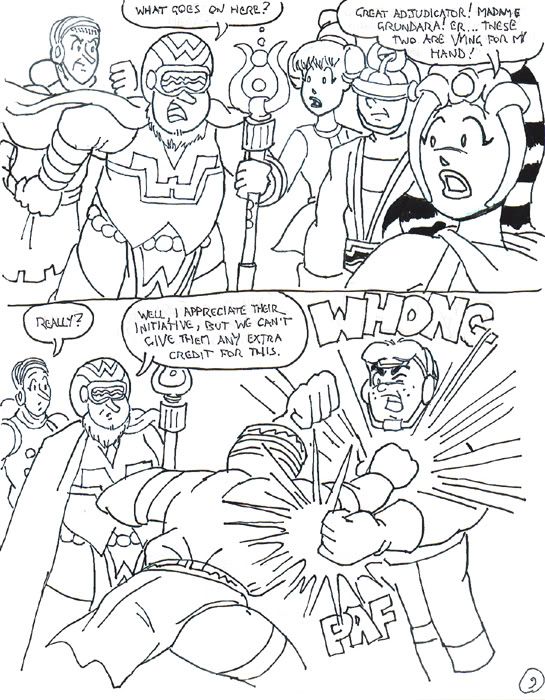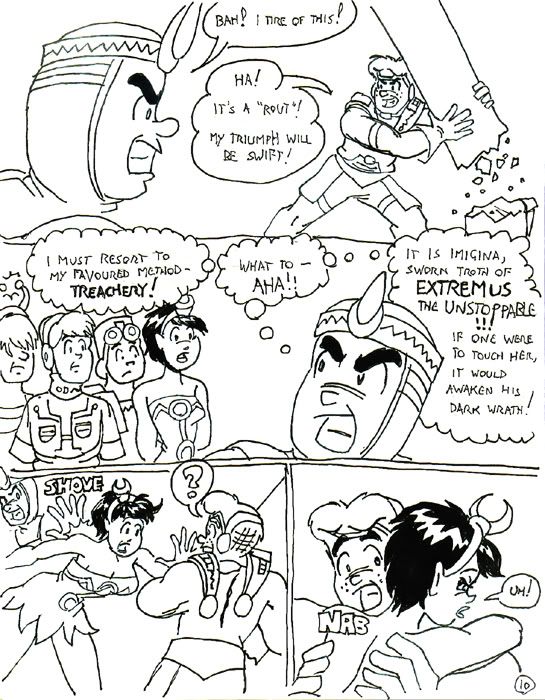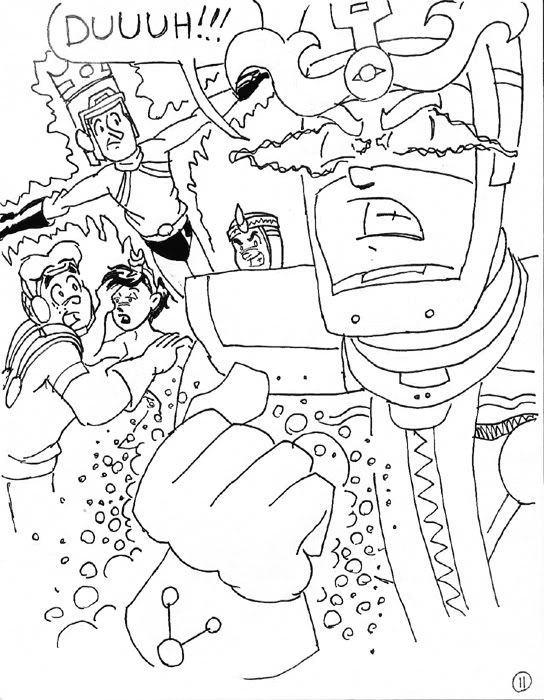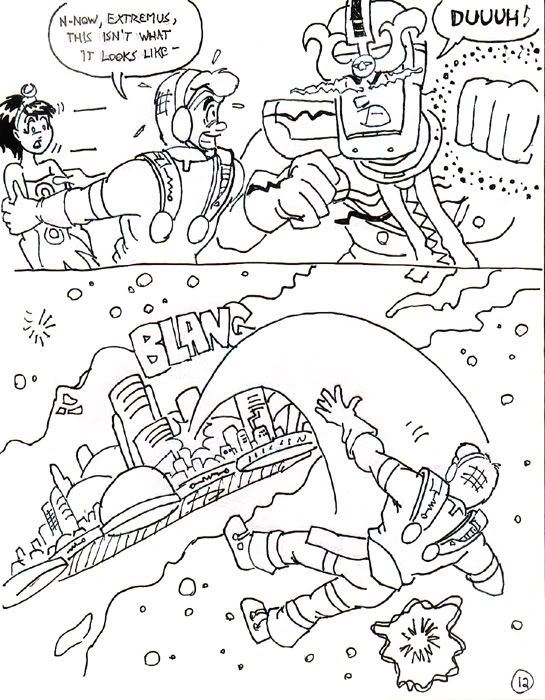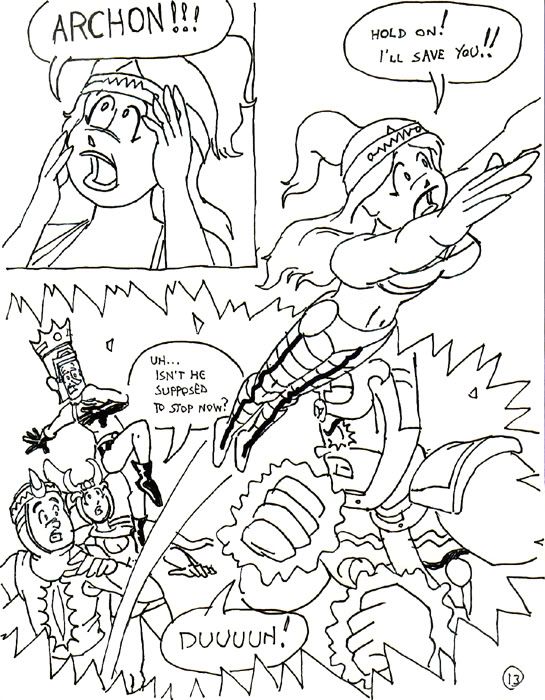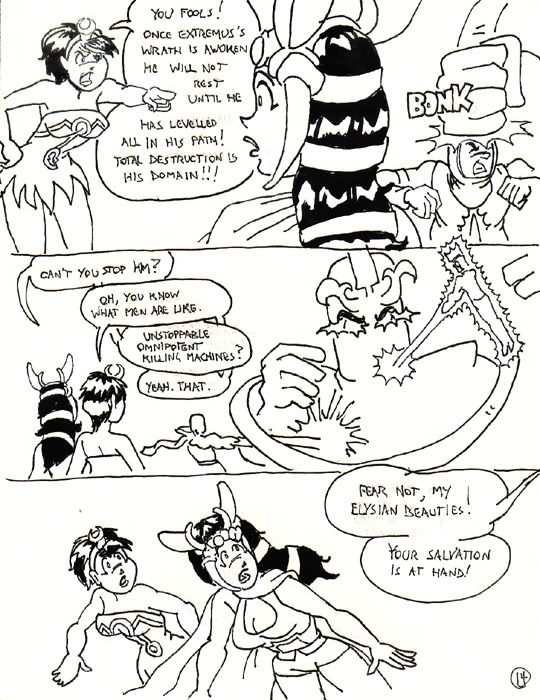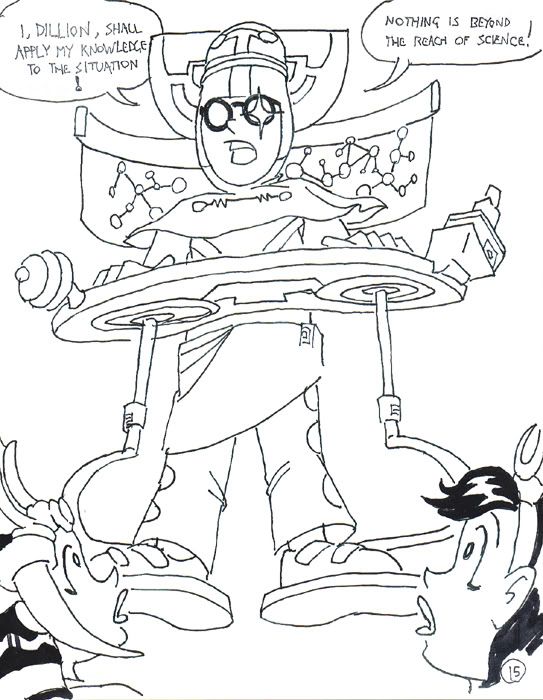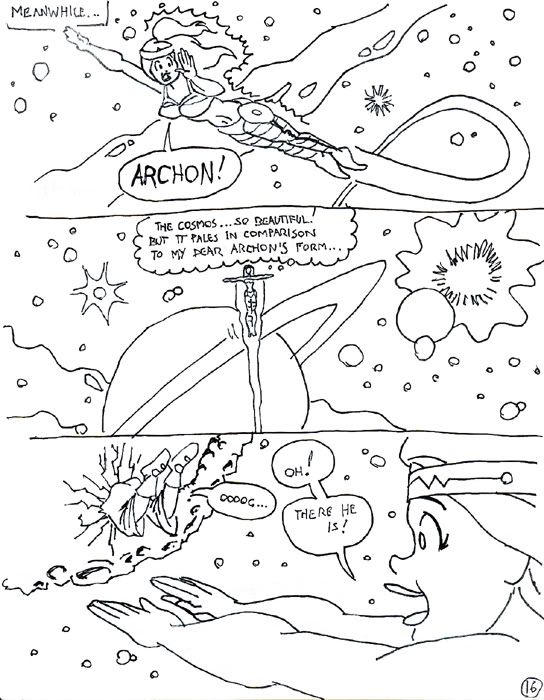Monday, December 7, 2009
Because I Was Losing Track of Which Earth This Was
OK, so I just learned about this. More details here (warning: link to AICN).
My first thought: this could be big. Very, very big.
Don't misunderstand me. In terms of the actual stories they apparently plan to tell, this sounds, um, inessential. Well, OK: unbelievably boring. But I'm saying that from the perspective of a longtime superhero comic reader. From the perspective of a teenager who hasn't read a Superman or Batman comic before--which, let's face it, is by no means improbable these days--this could only be somewhatboring.
Um. I'm getting a little off track here. Let's circle round and come back.
The crucial thing here is not the story, it's the publishing strategy. These are trade paperback OGNs aimed specifically at the book market, with a major publisher providing the marketing muscle. That's the potential paradigm shift here. In terms of sales, what the Big Two have been doing wrong has has less to do with their subject matter than their ability to break out of their fanatically loyal but tiny audience pool. Recent attempts to do so have largely been well-meaning but somewhat doomed, because they were creating material for new readers with no way for those new readers to get to them. Not only were they sold in the terrible pamphlet format, which in and of itself is forbidding to anyone who isn't a hardcore nerd, they were plunked on the direct market store* shelf alongside Rape Avenger and BoobGirl or whatever. And since "new readers" generally translate to "kids", you can imagine how well these have raked in the newbies.
This all seems pretty obvious to me, and I doubt many people would disagree, though given that a lot of people have a vested interest in the direct market they may balk at what needs to be done. But there's been pretty much no excuse for DC and Marvel to keep doing this; their job, or the jobs of the comic divisions at least, is to get their product out there, and they've suffered from an appalling lack of leadership in this regard. You get the definite sense that it's a combination of nerdy short-sightedness and fogeyism; bizarrely, a lot of comics publishers seem to be genuinely convinced--still--that the gold rush of the early 90s is going to return, and that that was ever a logical model for selling comics in the first place. I think that's part of the emphasis on the pamphlet format, and the reason they charge so much per issue; they're still stuck, if only subliminally, in the collector's mindset. Or rather, a lot of their readers are, and attempts to force them to move on have failed, so they figure they may as well keep catering to that attitude.
This, of course, goes against the whole reason pamphlets were created in the first place: they were cheap. You could buy a stack of them and not be out much money, which meant that your buying habits could be dictated by nothing more than "that looks cool". Which is how people would prefer to buy things, generally. When the prices get jacked up to the level they're at it becomes a matter of YOU MUST BUY THIS ISSUE BECAUSE IMPORTANT CONTINUITY STUFF HAPPENS, which is a pitch that only appeals to the hardcore. I really do think it's as simple as that.
So. Now we have DC launching this series which will be more accessible (it's an odd fact that Graphic Novels, even if they're more expensive than the individual issues that make them up, still feel more satisfactorily priced, because you get the sense that you sat down and read a full story), and are going to be plunked down where the non-hardcore can see them. I don't think a lot of Jane Austin fans are going to be compelled to pick this up, but the vast potential audience of "kids and teens who saw the movie" are actually being reached. Combine that with some actual marketing which, again, will presumably go beyond "Previews", and you've got the potential for superhero comics to actually become a popular genre again.
Now, I still think there are a lot of potential missteps here, starting with the subject matter. No one, and I mean no one, needs a new retelling of Superman or Batman's origin at this point. DC is clearly playing it safe, the way they've done with their animated movie series, but I think they're misjudging the market a little. The kid's and young adult's book audience is not as pathologically addicted to comfort food as the adult superhero audience; they're probably, on the whole, more likely to be looking for something new and different, especially if they're picking up a graphic novel for the first time. A new story featuring either of these two characters would probably go over better with new readers, not to mention the many lesser characters DC can't peddle to geeks but who could be big with kids. (If their next offering is a well-done Wonder Woman story, I think it could be huge--the ratio of girls looking for stuff to read is immensely higher in "real" bookstores.)
And it doesn't look much like these stories are aimed at younger kids, which is already a fairly successful audience for graphic novels that make it to bookstores. Likewise, even aside from the tiresome grim 'n' grittiness of many current titles (and both Straczynski and Johns are guilty of this) there's a sense of self-importance around superheroes that has led to lousy storytelling--decompression, talkiness, cloying pop culture references, you know the drill. These comics are so busy trying to be REAL ADULT DRAMA that they've forgotten the fun and imagination that appealled to kids, which is how they saturated the culture in the first place. If these new books are too heavy on the "standing around angsting" school of comics, they may not find traction.
But this might not matter. I think that a lot of comics fans--and I'm guilty of this--focus too much on the nitty gritty of the stories, thinking that there's some magic element we're missing that will achieve popularity. It's good in a sense, because it keeps us honest, and anything that can draw superhero comics back from the morass of self-referential wankery that they're constantly threatening to fall into is a good thing. But the fact of the matter is, there are a lot of cruddy movies, TV shows, and books that achieve massive popularity, and they're not, on average, any better than the average lousy comic. So I'm led to believe that yes, it is a failure of delivery rather than a failure of content that's been holding comics back. The new approach is a huge step, and it might be all it takes to break the logjam. I'll be watching this with interest...
*I happen to be lucky in that I have always had access to appealing, well-run comics stores; Toronto probably has more of these per square mile than any other city in North America, except maybe San Francisco. But even here, I've encountered enough of the traditional fleapits run by people with terrible social skills to relate to the horror stories, and let's face it, the very material offered by the comics industry lends a certain off-colour character to all but the most specialist of stores.
Friday, December 4, 2009
Whoot
Look at the awesomeness! I got this piece of Lemuria fanart from one Steph Cherrywell:

Steph, it turns out, is the creator of Intragalactic, a comic that I shamefully hadn't heard of--shamefully because I love space travel humour strips. I've been letting my webcomic trawling slide quite disgracefully over the past year, actually. Anyhoo, the strip's about a futuristic ice cream truck...ship and its zany crew, led by captain Benjamin Glee, who despite the name is a woman. In fact, she's an almost dementedly brave, cheerfully oblivious woman who's packing some extra pounds.
I think you can see Ms. (Mrs.?) Cherrywell and I seem to be of one mind here.
The strip's absolutely hilarious, and the archives aren't too huge, so go read it right now!
Labels:
Giving My Fans a Thrill,
Lemuria,
Linkblogging,
Miscellaneous
Tuesday, December 1, 2009
Origin You Glad I Wrote This?
So apparently the filmmakers, or at least the star, of the upcoming Green Lantern movie are saying that it "won't be a laboured origin story". This is the kind of thing that makes fanboys breathe a sigh of relief, since the common wisdom would have it that spending too much time on the origin is a mistake in a superhero movie. And I agree...except...
What do we mean by "origin", exactly?
Because when I started to think about it, I realized that there are very few superhero movies that don't have their hero gaining their amazing powers within the first twenty minutes or so. It sometimes takes longer to get them into the costume and adopting the pose of superpowered crime fighter; Batman Begins was nearly half over before Batman made his first appearance, and Spiderman in his classic suit wasn't much faster on the scene. You can see why they made those decisions, though: Batman was rebooting the franchise, setting themselves apart from the Schumacher films with a new beginning, so it made sense to tell that story, and Spiderman--well, more on him in a moment.
All the others usually have their powers and costume by the end of act one (Iron Man has a prototype version of his costume, but it's still a costume). That seems reasonable to me; so why do so many superhero movies feel kind of pedantic and slow to begin?
I think it's because there's often a lot more to a superhero's "origin" than how he got his powers and costume. There's also the question of how he (or she, but let's face it, if it's a lone hero, it's always he) got his personality. And that's exactly the kind of thing that can make for the plot of a movie, so naturally it's going to form the spine of his first outing. So far, so good. Except...
A lot of people who make superhero movies seem to think that a superhero's character arc needs to be "how he became a hero". And this is where the problem arises.
There's only one superhero character who's journey towards heroism, in the movies, is legitimately interesting: Spiderman. You could maybe make a case for Wolverine, too, but his attitude towards heroism doesn't strictly change much, it just gets recontextualized (i.e. he's the Clint Eastwood-type loner who learns to care about the people around him/becomes politically aware). All the other superhero characters were given fairly simple, straightforward origins in their respective origins, and no one's ever been able to retcon these satisfactorily. Few have even tried. That's because, in the comics, if the hero doesn't take a relatively heroic pose early on, it's awful hard to get them fighting crime and thus make the story happen.
The end result is the plot element I hate most in any superhero movie: The Hero Must Learn To Use His Powers (usually while coping with everyday life). That might seem like a weird thing to hate on, but I think it gets to the root of what I'm complaining about here.
Look at Iron Man, for instance. Decent enough movie, but it's marred by a second act that is comprised almost entirely of The Hero Must Learn To Use His Powers (or, uh, THMLTUHP, I guess). He foils a few villains, low level terrorists, who are essentially just the classic Bank Robbing Thugs you always see get taken out in these movies. They may as well be practice dummies. Meanwhile the Big Bad Villain is scheming away with his evil schemes, schemingly, but doesn't do anything until act three. The fact that this works at all is because Robert Downey Jr. is always fun to watch, and director Jon Favreau knows how to direct actors noodling around and hanging out, but it's still a loooooong stretch of nothing much that could easily, from a writing perspective, have been trimmed.
The Fantastic Four movie is the worst offender. I've heard that the early Fantastic Four scripts opened with the FF already in their classic forms, having already become world famous heroes, and I think that's exactly right; everything about the FF that's interesting comes after the basic setup has been taken care of. So of course, in the movie we got, director Tim Story lets that setup last for most of the movie. Forget exploring anywhere or going on adventures or anything; most of the movie is spent sitting around the Baxter building, while Johnny Storm almost, but not quite, does something interesting with his powers, and Dr. Doom slooooowly morphs into the form we all know him in.
I think every superhero needs their own pace in terms of this stuff (I don't really have a problem with the first X-Men, for instance, because it was bringing together a large cast in a complex world), but the point is that THMLTUHP is frequently a dull patch that drags down the middle of a movie while we wait for the good stuff to start up again. Future superhero movie directors: If you MUST have THMLTUHP scenes, make sure they go along with the actual plot, or provide some interesting character scenes, or something.
And if you're pulilng this crap because you don't have the budget to fill the movie with superhero stuff, maybe you, y'know, shouldn't be making a superhero movie at all. I'm just sayin'.
Wednesday, November 25, 2009
Children of All Ages
Chris Butcher is wise. I might quibble a little with some of his points--I think there are successful "All Ages" books when you step outside the superhero paradigm, like Bone--but I am not a man who has made a living as a comics retailer at one of the best comic book stores in the world, so feel free to ignore me and listen to him.
Thursday, November 19, 2009
And It's Volume THREE, Dammit
As usual, comics bear the brunt of small-minded douchebags who would like to control everything we say, read and hear. But cheers to the Kentucky Library Association.
Saturday, November 14, 2009
A Fiery Shower of Pixels Storming the Shore of Your Eyeballs
Lemuria issue #1, all 32 pages of it (including some that aren't online), is now available for download at DriveThru Comics, in both PDF and CBZ format. The cost is a mere 75 cents...just like comics used to be back in the good old days, when there were only four colours and the paper was all yellowy and rough, the way God intended. So for those of you who've always wanted to read Lemuria while curled up around the fire with a snifter of port, you can now do so.
Also, there's a Very nice four-star review from featured reviewer Brian LeTendre, which is kind of amazing, since it went up within 8 hours of the PDF file being uploaded. Efficient!
I'm hoping to have more downloadable stuff up at that site before the year is out. Will I let you know? Oh dear heavens yes.
Labels:
Comics Events,
Lemuria,
Please Buy My Stuff,
Where I'm At Now
Monday, November 9, 2009
I Want 15 Minutes of Internet Fame Every 15 Minutes
Hey whoa!
I kicked back this weekend and spent a goodish chunk of it reconnecting with "friends" and "family"--you know, those things that interfere with making webcomics. But before I took my little hiatus from cyberspace, I read Chris Sim's Invincible Super-Blog, as I do pretty much every day. I'm sure anyone reading this knows of Chris, and he doesn't need my pathetic pimpage, but he truly is one of the most hilarious and enthusastic comics bloggers around. There are a whole ton of great comics bloggers out there--I should probably do a post linking to my favourites--and many of them are intellectually invigorating and funny, there's a certain collective sense of grimness hanging over them, a despair at how far the noble comics medium has sunk. Chris, along with Bully The Little Stuffed Bull, provides the vital service of keeping the comics blogosphere fun and engaging, and quite possibly prevents most of us who are still devoted to comics from slitting our wrists.
Anyway, while I'm sometimes a bit shy about pimping my stuff elsewhere, when Chris posted this, it struck me as a perfect opportunity to link to The Archon, not expecting more than a nod or two. To my surprise, I got a bunch of glowing praise in the ISB thread and a ton of hits, leading to a post on Johanna Draper Carlson's Comics Worth Reading blog. Which is another really excellent blog that I do read a lot. Sheesh, maybe I won't make a new post, this one has plenty of links.
It's not like I set the internet on fire or anything, but it was really gratifying to see something I've done get that much attention. A lot of the time I feel like I'm labouring in the trenches a bit, not making much of a splash out there in the comics world, so even a little thing like this means a lot to me.
Enough narcissism. The long and the short of this is that I'd been mulling over doing another, similar project--also featuring Dan DeCarlo style vs.comic-book SF--and this has made me determined to do it. More to come...
though I do find it a bit depressing how many intelligent, engaged feminist comics bloggers are
Which also means, incidentally, that traffic on this forum probably spiked heavily this weekend, for whatever that's worth...
Thursday, November 5, 2009
Something Cool Is Coming...
...hopefully by early next week, or sooner. I'm going to start in with a series of downloadable comics, some of which will be tied to my existing strips, and some of which may be totally original. This is going to be through DriveThru Comics, in PDF and (hopefully) CBR formats, for a teensy fee--under 50 cents for the first two.
The first is going to be a downloadable version of Lemuria, issue #1, including pages that aren't on the internet yet. The second is going to be the bonus material from Freak U. Book One, which has so far only been available in print form; it's a history of Omega House detailing many of the members who have existed over the years (Yes, Kalinar is in there) since the frat was founded in the 50s. There'll also be bonus material, art 'n' pinups and maybe a short new comic. Freak U. fans should definitely grab this if you haven't picked up the print edition. (Which is still available, by the way.)
I've been wanting to tell spinoff tales of the earlier members of Freak U. for a while now, this may be the best venue for that. I have an idea for a story starring Kalinar, since he's proven to be a popular character, and there are other iterations of Omega House I'd like to write about (the '69 and '86 groups in particular).
On top of that, I think this is going to be the venue in which I produce more Critterville stories. It's been praised in a few corners of the net, and I've got a ton of ideas for the characters, moving the whole strip more in a Carl Barks action-adventure kind of direction. Consider that 12 page story a warmup and an introduction to the world.
And there's even more brewing, including a couple of potential collaborations with very talented artists.
So yeah...I'm not exactly taking it easy here.
Tuesday, November 3, 2009
Halloween '09

You can't really tell, but I'm not just a cowboy, I'm a STEAMPUNK cowboy. With, like, gears and widgets on my lapels and stuff (which are made out of metal).
...Yeah, you had to be there.
Really, you should have been there. Best Halloween ever.
EDITED TO ADD photo in which I don't look like a jackass:

Well, mostly...
Thursday, October 8, 2009
And the Totally Cosmic Finale...
As mentioned, I confess some of the below were inked a few days after 24 Hour Comics Day, but the pencils were all finished...that still counts, right?
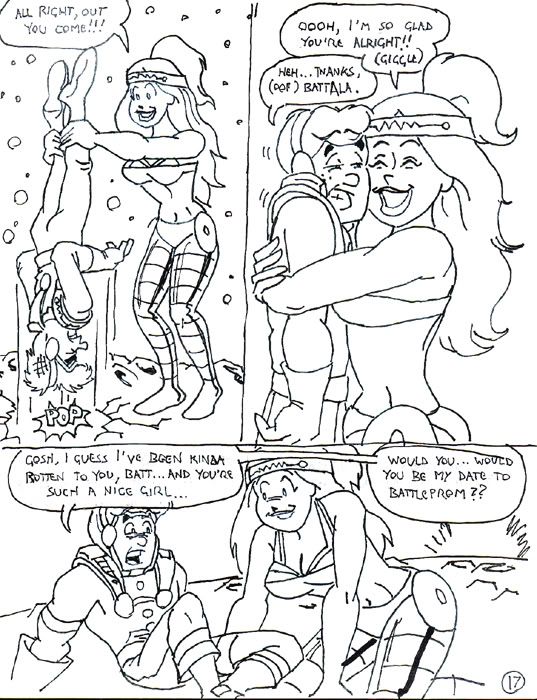
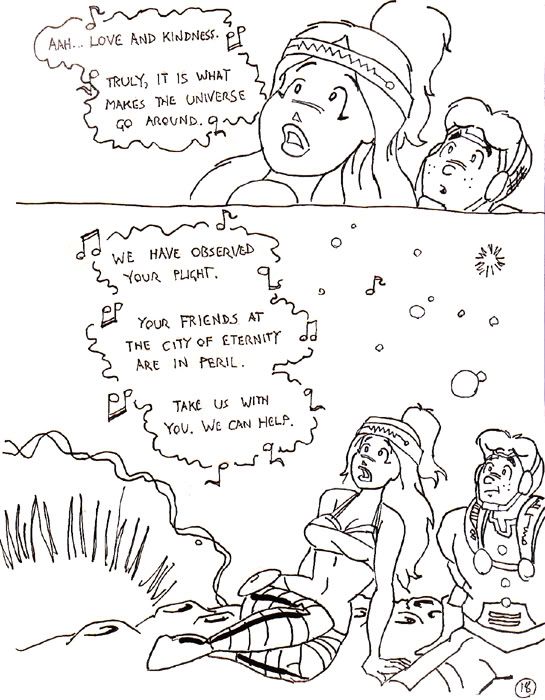
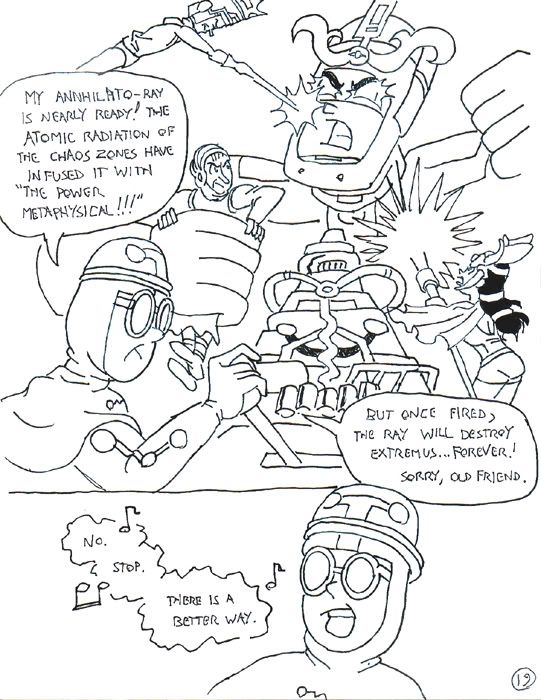
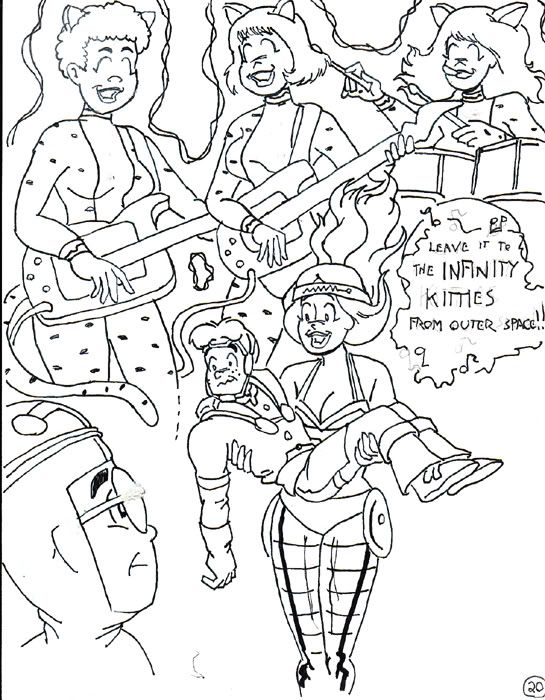
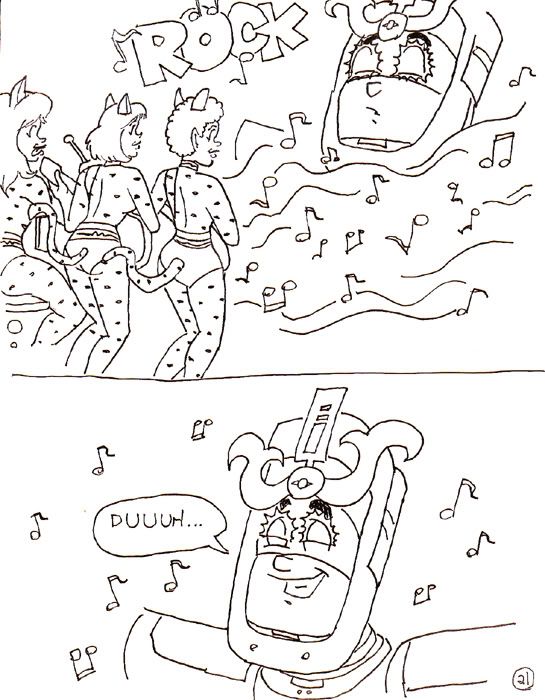
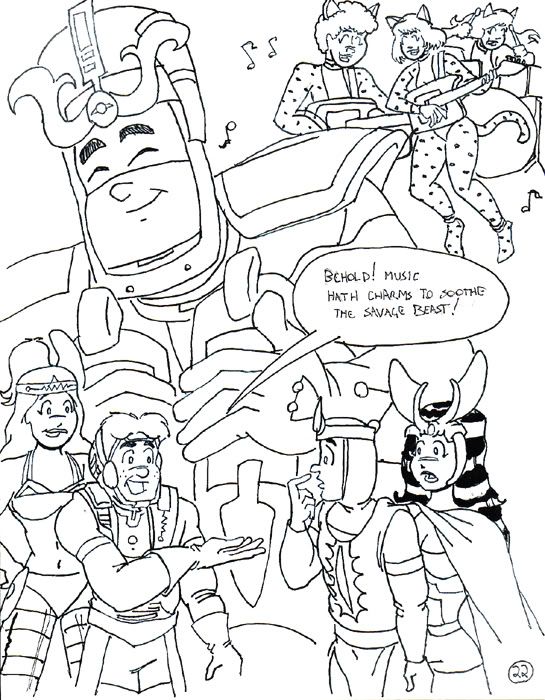
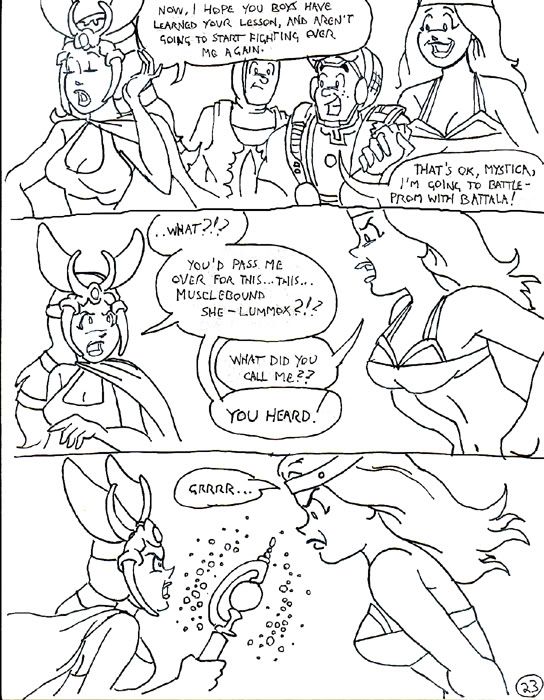
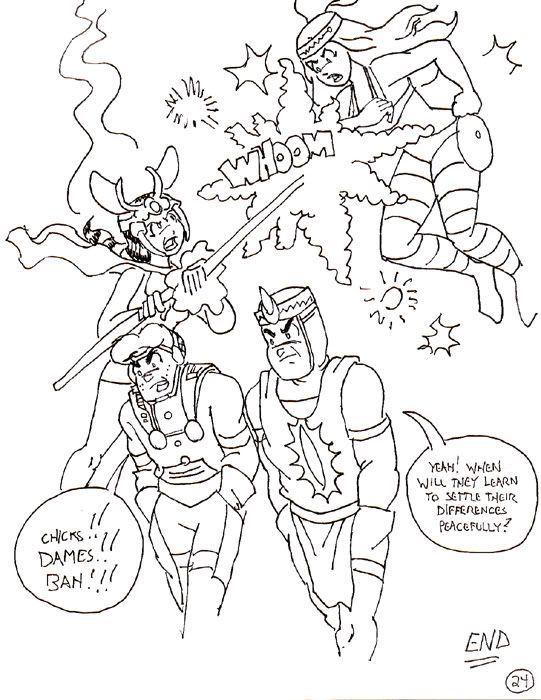
Wednesday, October 7, 2009
Pep and Power
And here it is, making its belated debut--the first installment of my 24 Hour comic, "The Archon".
Yes, I am a silly man.
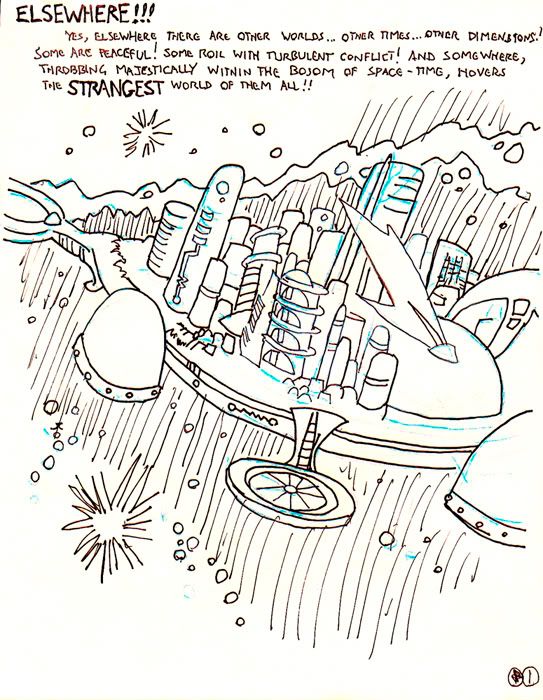
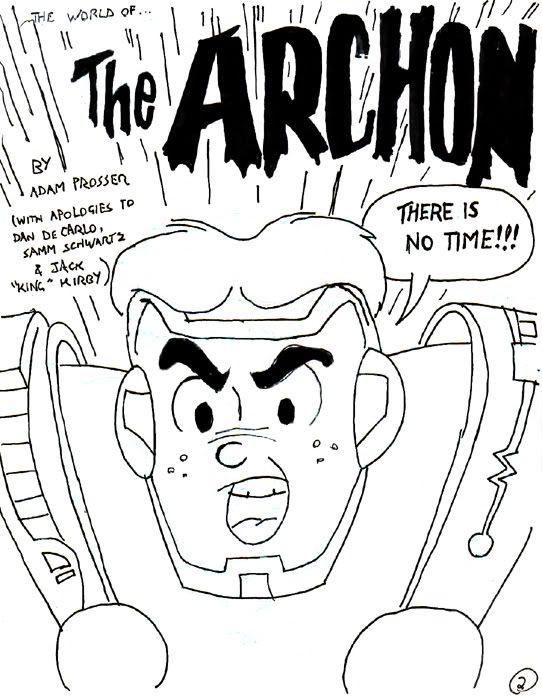
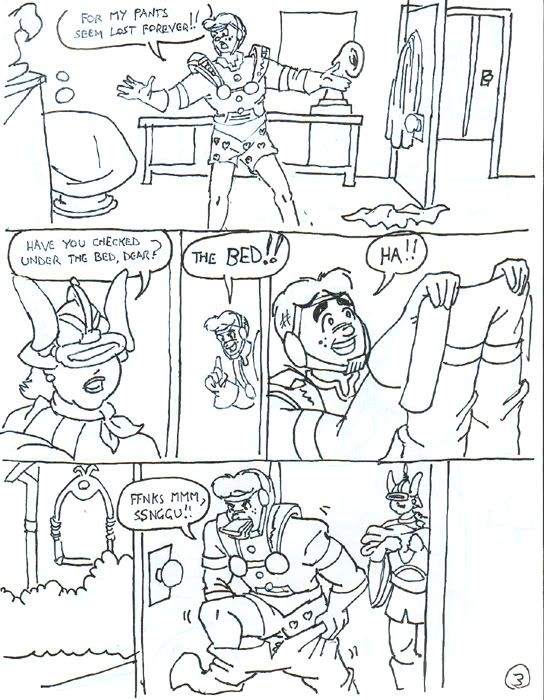
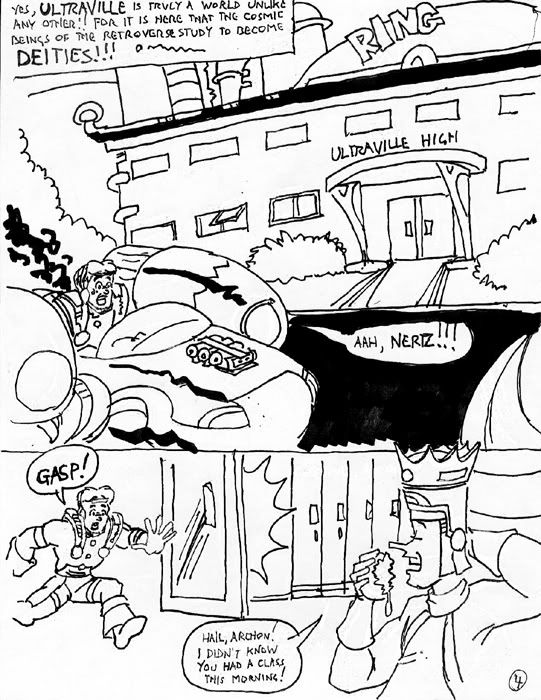
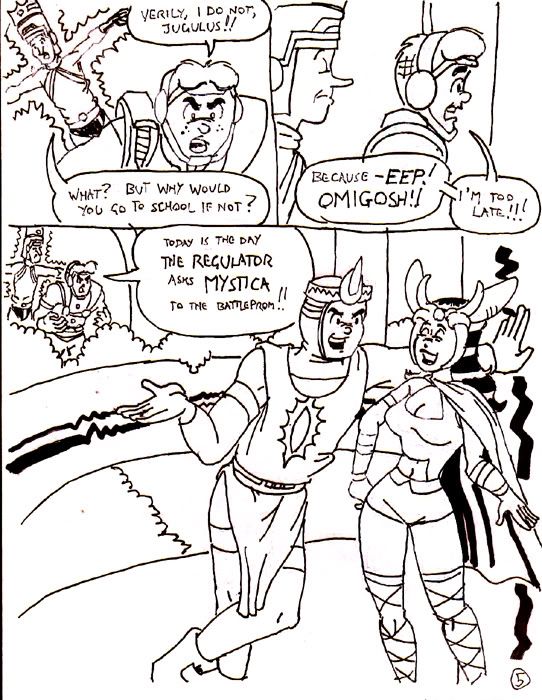
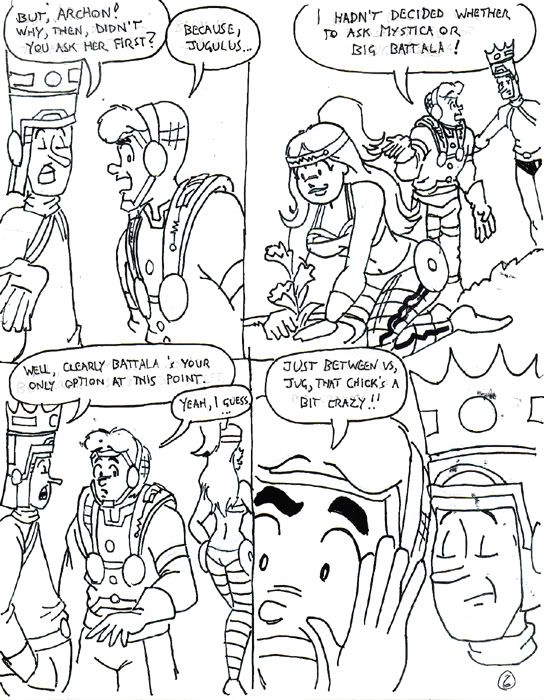
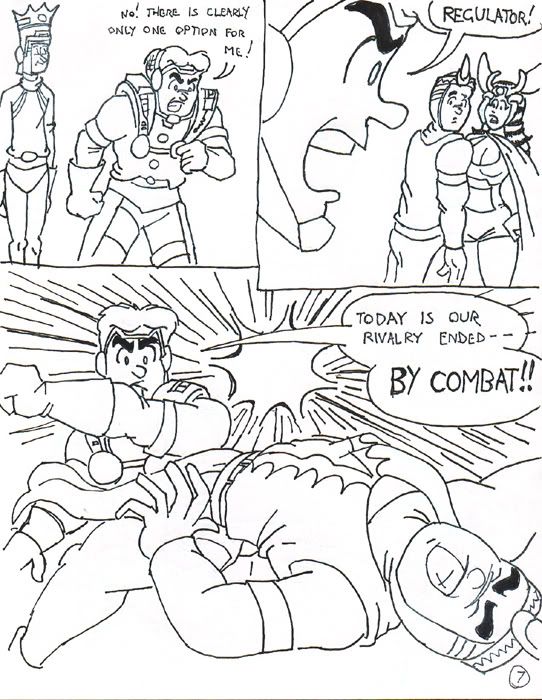
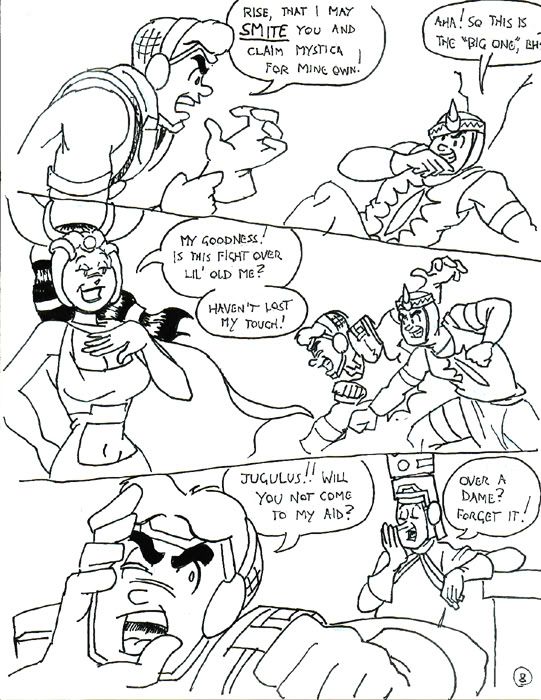
Sunday, October 4, 2009
Hour 25
24 Hour Comics Day: it is fun.

No, I'm not the shining golden god of the minifridge, I'm the guy with the navy blue shirt and nametag on the couch.

Yes, there's a reason why my workspace is covered with Archie comics. You will see why when I post my comic.

We held our marathon in Isabella's Chocolate Cafe in scenic downtown Oshawa. The owner graciously agreed to stay open all night, which necessitated starting at 10 am instead of noon.

As it happened, though, we were all gone by 4 am. Well, I assume we were. As of 3:30, when Mike and I left, there was still one person there--that would be Tom Savage, the guy on the far right, who was also the first to finish 24 pages, and was going for 30. In fact, Tom and I may be the only ones to have actually finished 24 pages at all--I won't know for sure until we compare notes. I assume most of the others are still in bed...
But as you may have derived from the above, yes, I finished 24 pages! Technically, I didn't finish inking the whole thing, so maybe I'm jumping the gun, but still, I consider that to be a real accomplishment (last year I got up to around page 13).
The whole experience was an incredible amount of fun. 24HCD really does need to be experienced as a group, in a communal location. I suspect it would have been even more exciting if this had been the first year and we'd been part of the whole worldwide comics jam--the main 24HCD site seems to have splintered off into a whole bunch of different blogs rather than a centralized site--but still, it was a hell of an experience. I suspect this is my first and last 24 Hour Comic, but I'll happily come down to future gatherings and participate in the vibe. It really is a great celebration of comics--maybe we should change the name to "Worldwide Comics Day".
Friday, October 2, 2009
Toronto FilmFest Reviews: Up in the Air
I started the filmfest with the work of one "Juno" alum, and I finish it with another. (And both have J. K. Simmons in them!) Jason Reitman's had both his previous films premiere at TIFF, and both times people were buzzing madly about them during the fest, so it's not surprising that "Up In the Air" received a hero's welcome this year, with people already anointing it this year's Oscar frontrunner. Unfortunately, even if the hype had been more modest I'm not sure the movie would have lived up to it. While this is a much better movie than the standard Oscar bait, it's actually probably my least favourite of Reitman's movies so far. Since my favourite is the wickedly satirical "Thank You For Smoking", his first movie, it's hard to avoid the feeling that Reitman is devolving as a filmmaker, or at least being swallowed by the Hollywood pap factory.
George Clooney plays Ryan Bingham, a successful corporate hatchetman who flies around the country firing employees for management types too craven to do it themselves. He's one of these guys who's adapted himself perfectly to the kind of job very few people can do successfully--he has to deal with angry, devastated, hopeless, sometimes even suicidal people, and make them leave, if not happily, than at least complacently. Ryan's not the kind of jerk who takes pleasure in this stuff, either--he sees it as a crucial part of his job to understand the people he's terminating, and set them on the path to getting their life back together. In fact, he honestly seems to believe he's giving people a neccessary push towards finding a better career, and he may even be right in some cases. Essentially, Ryan seems to enjoy engaging very passionately with people for a short period of time, and then cutting them loose. If you think this might be a metaphor for how Ryan approaches his relationships, well, give yourself a cigar.
Another way in which Ryan is uniquely suited for the job: he loves travelling, which he's got down to a science. Most business travelers yearn for the days they can spend at home; Ryan begrudges every moment he's not on the road. In fact, he's angling to become only the 8th person ever to accrue one million frequent flyer miles, which would grant him membership into an elite club with a ton of traveller's perks. He's got no one waiting for him at home--even his sisters (one of whom, Julie (Melanie Lynskey) is due to get married in a few weeks) are virtual strangers to him. When he meets Alex (Vera Farmiga), a fellow traveller with similar proclivities, he seems to have hit the jackpot: Alex jets around the country as much as he does, and she's happy to have a series of romantic flings with him every time their paths cross, then leave him alone the rest of the time.
Unfortunately, Ryan's lifestyle suddenly finds itself threatened by Natalie (Anna Kendrick, who's great), a fresh-out-of-Princeton middle-manager hired by his boss (Jason Bateman) to streamline their business. Her solution involves using teleconference screens to fire people over the net, an idea which Ryan hates, and with pretty good reason. A compromise is reached: Natalie will tag along with Ryan for a few weeks and learn the ins and outs, which she hopes will refine her process, and he hopes will show her and their boss what a lousy idea this is. Naturally, a mentor-student relationship develops, and both parties Learn Something About Themselves.
This movie is trying to be a cross between Jerry Maguire and In Good Company (that's the Dennis Quaid/Topher Grace movie from a few years back about a rivalry between an older and younger executive that morphs into friendship). I liked both those movies--yeah, I like Jerry Maguire, sue me--because they had a sense of humanity first and foremost. You couldn't call them "unpredictable", per se, but it felt like the plot was evolving naturally out of the characters' decisions rather than following a screenwriter's formula, and its emotional beats felt earned. "Up In the Air", on the other hand, features some fine acting--that's probably the best thing about it--and the characters are relatively well-fleshed out, but the plot feels like a bigger concern here, and it's entirely predictable once you get to the second act. In fact, the climax features the kind of "romantic" moment that Clooney, with the Coen brothers, already skewered in "Intolerable Cruelty". There's a late, minor twist, but I saw that one coming too. Frankly, the whole movie feels like it's trying too hard to be heartwarming.
This is a light and genial movie, suitable for a holiday movie rental with your parents or something, but there's no way it deserves a Best Picture win. And Reitman really needs to steer his ship towards edgier waters--I would hate for "Smoking" to turn out to be a fluke.
Monday, September 28, 2009
Toronto FilmFest Reviews: The Invention of Lying
There seems to have been a mini-golden age for British comedy shows in the last decade; I've gone on about The League of Gentlemen in the past, and I've only just discovered the genius that is Garth Merenghi's Darkplace, to name two. Of course, the two big stars to emerge from this are Simon Pegg and Ricky Gervais, both of whom have had mixed successes in movies--Pegg's starred in two absolute classics, but away from Edgar Wright he actually has a pretty lousy track record. As for Gervais, he's made some forgettable cameos (Night at the Museum? Why, Ricky?!?) and starred in one decent but overly genial movie, Ghost Town. I say "overly genial" because Gervais's TV work, for the lucky three or four of you who have yet to experience it, is known for being dark and cutting and gleefully horrible, and I'm among the many who are deeply worried that Gervais is too eager to neuter himself for Hollywood.
This worry lingered a bit for the first few minutes of "The Invention of Lying", which, as you no doubt know by now, is about a world in which everyone tells the truth, through some unexplained quirk of history (or possibly neurological evolution?) The concept, needless to say, provides tons of comedic fodder which is used to its utmost. The concern came because most of the really nasty stuff, at first, was aimed squarely at Gervais's character Mark Bellison, as he goes on a blind date with Anna McDoogles (Jennifer Garner) and is, naturally, subject to her constant torrent of frankness. Despite her eventual admittance that she had a better time than she expected, she also tells Mark that she won't be going out with him again, because he's just not attractive enough.
This is all quite funny but a little on the fluffy side. It's once Mark goes into work the next day that the movie really starts to flex its muscles and become darkly insightful and imaginative. Mark works as a screenwriter, which in this world is a pretty limiting profession (I'll leave it to you to imagine the details), and given his recent output he's on the verge of losing his job, as his secretary (Tina Fey, in the first of many MANY celebrity cameos) can't help but remind him. His professional archnemesis, Brad Kessler (Rob Lowe) gloats over his coming downfall in a hilariously straightforward depiction of office politics (at least there's no backstabbing in this world!). On top of all this, Mark is on the verge of being evicted from his apartment...until an opportunity arises, a couple of neurons click together, and Mark invents the world's first lie. Suddenly, Mark has the means to turn his life around, though even with his newfound power there are bound to be complications.
The whole first half of this movie builds and builds, getting increasingly daring in where it's willing to go for humour. There's one moment where Mark backs away from taking full advantage of his power, which felt a little like Gervais getting cold feet, but it's more than made up for by what comes later. Mark comes up with one big lie, meant with only the best of intentions...and suddenly his whole society is in turmoil, and Mark keeps digging in deeper in an attempt to fix things. Believe me when I say I couldn't *believe* where Gervais was willing to go with the concept, and it's not even hinted at in the trailers. The knives are going to be out for this one, believe me.
I was so busy picking my jaw up off the floor that I didn't really mind when the rest of the movie quickly slipped back into romcom mode and spent the bulk of the remaining time on Mark and Anna's relationship, which does get a little sappy. I do feel like the air is leaking out of the movie throughout the third act (though there are still a couple of great gags), which is disappointing, as I feel like the movie could have been a true classic if it had continued in the direction that it was going. Still--the fact that it went there at all is pretty amazing, and more than justifies the price of the ticket. 2/3rds of a comedy classic are better than none. Also, this movie cures cancer and is made of ice cream.
Toronto FilmFest Reviews: Shinboru (Symbol)
When is a subgenre born? Does it simply derive from a formula or certain elements that are reused often enough? Or can it be a set of expectations you bring into the theater with you? I ask because Symbol seems to be deliberately riffing on all of these things, trying to find the line where familiar tropes become, well, symbols. It plays both with a familiar subgenre and a less-familiar setup that's on the verge of becoming a subgenre at this point; you could even argue that this is the movie that pushes it over.
For most of its running time, Symbol seems to be two completely unrelated movies running parallel to each other. One is a Mexican Lucha Libre movie (or maybe "short film" is more appropriate, given the relatively small amount of running time it involves). It's perfectly conventionally shot and with a simple narrative; the wrestler Escargot Man prepares for a tag team match, while a kid in the audience cheers him on.
The other storyline is deliberately, seemingly perversely different. A nameless Japanese man (comedian Hitoshi Matsumoto, who also wrote and directed) wakes up in a featureless white room about the size of a bachelor apartment, wearing a set of candy-coloured pajamas and a ridiculous bowl cut. He has no idea how he got there. Exploring the room, he finds exactly one notable feature: a button on the wall shaped like, uh, male genitalia. Pressing it triggers an explosion of cherubs from the wall, who leave behind...more penis-shaped buttons. Pressing those buttons, in turn, triggers a bizarre and seemingly useless array of objects that come shooting out of the walls, along with other, generally disagreeable effects (like one which turns into a butt and farts toxic fumes at him). Eventually, though, some of the buttons start to reveal their potential usefulness in mounting an escape...except that whoever trapped him in this room seems determined to screw with his head.
Believe it or not, all this weirdness turns out to be headed somewhere relatively straightforward. I mean, it's still a weird movie that I'm sure even Matsumoto wouldn't be able to explain completely, employing as it does Lynchian dream logic and a love of the absurd for the absurd's sake. But the two threads do end up coming together in a way that...well, "makes sense" might not be the way to put it, but they do come together to make a point. The movie makes an attempt at profundity near the end which is a lot more palatable for being weird and slightly inexplicable.
Up until then, aside from the slight and seemingly straightforward Luchadore subplot, the movie is a one-man show. Matsumoto unfortunately depends a little too much on mugging and acting zanily idiotic--the character he's playing makes a number of choices that reveal him to be a dimbulb--but the situation is a natural one for humour, especially as the faceless forces that control the room seem to enjoy tormenting him. There's also a hilarious recurring sequence in which comic book panels narrate Pajamas Guy's various plans for escape while Matsumoto grooves out in the foreground. (And the narration is in English for some reason!)
I'm not sure if "Shinboru" has some other shading of meaning that doesn't translate well into English--I'm assuming that the Symbol of the title refers to the little penis-buttons (yeah, I knew writing this review was going to be awkward), but it also seems to relate to the various motifs and elements we expect in a genre story, and the storyteller's attempt to break free of them. In that sense, this is an extremely meta movie. One thing's for sure, if the movie's about helping to define genres, than its clearly staking out a patch of ground under "bizarre Japanese mindf***".
Monday, September 21, 2009
Toronto FilmFest Reviews: Bad Lieutenant: Port of Call New Orleans
#2 in the "didn't see the original" lineup for this year's fest. (I actually ended up skipping the third.) This has been a fascinating movie to watch being made--you've got one of the most eccentric directors and one of the most eccentric actors around, plus a feud between Herzog and the director of the original (not the most sane of directors himself), a villain played by a (shudder) rapper-turend-actor, and a small role for Val Kilmer into the bargain. Throw in one of the most off-the-wall trailers of the year, and it doesn't seem that unreasonable that the end product would be one of the most memorably deranged movies ever made. And yet this movie--despite certainly having off-the-wall moments--is ultimately disappointingly conventional.
Nicholas Cage plays Terence McDonough (No relation to H.I., I assume), the titular Bad Lieutenant this time out. In the wake of Hurricane Katrina, Cage did something valorous--it may have been saving a prisoner who'd been in lock-up as the flood waters rose around him, and who Cage (and his partner Stevie Pruit--Kilmer) seemed happy to let drown right up until the last moment. It's not made clear if that's what earns him his promotion to lieutenant, or indeed if it's what caused the back pain that plagues him a year later. Terry's prescribed medication by his doctor, but being the rotten egg he is Terry already seems to have other pharmaceutical interests, including crack which a fellow officer regularly procures for him from the evidence room, and which he shares with his prostitute girlfriend Frankie (Eva Mendes). Unfortunately, the other officer is getting cold feet, and Terry's supply is drying up; he's reduced to shaking down kids outside of clubs (or maybe "reduced" isn't the right word--he seems to outright relish it).
At any rate, the plot kicks off with the murder of a family of Sengalese immigrants who may have been involved with drugs. The clues are pointing at a local drug dealer, Big Fate (Xzibit, who's not bad, despite my earlier snark) but as Terry pursues him, he seems to care less and less about solving the crime and more about finding ways to turn Big Fate into a useful friend. Meanwhile his gambling debts are piling up, his encounter with one of Frankie's customers leads to even bigger trouble, and the cocktail of drugs coursing through his system are on the brink of causing a neurological meltdown.
The movie I was most reminded of, watching this flick, was Scarface, despite the fact that the protagonist is ostensibly on the other side of the law. Both movies chart the "professional" rise and the psychological breakdown of a larger-than-life criminal who revels in bad behaviour, who may be troubled by guilt and even entertain thoughts of redemption, but doesn't seem to know how to accomplish this except by getting into more trouble. This tension between whether Terry will make a play at redemption or fall completely to the dark side powers the movie, and the outcome is by no means certain in a Werner Herzog movie. Likewise, Cage, in his usual full-throttle crazy mode, is constantly entertaining. We may not like to admit it, but we--or many of us, at least--enjoy watching people Get Away With It, indulging in our worst impulses without consequences (at least not for a while), and this movie provides this exact spectacle. In fact, this may be Cage's magnum opus when it comes to crazy performances.
Unfortunately, the movie itself is nowhere near as entertainingly unhinged as its protagonist. If you've seen the trailer, you've seen everything that qualifies as a "WTF" moment; the rest is a pretty conventional police/crime thriller. According to Herzog's remarks at the beginning, he didn't want to call the movie "Bad Lieutenant" at all, but he was being financed by the guy who owned the rights, and "wanted to start a franchise". This is a truly lousy idea, unless said financier plans to hire every demented director he can to keep remaking this movie in different cities. But even then, the end results here tend far more towards the conventional than you would hope, so I have a hard time getting behind that idea either. All in all, the various misconceived, train-wreck aspects of this movie seem to have cancelled each other out and resulted in a watchable but disappointingly middle-of-the-road flick.
Friday, September 18, 2009
Toronto FilmFest Reviews: Solomon Kane
For all his cinematic sins, I'll never be able to completely condemn George Lucas. The man reawakened the pulp action-swashbuckler, one of my favourite genres, and one that might never have been the same after the 60s and 70s if it hadn't been for Star Wars and Raiders of the Lost Ark. (I really don't want to get into whether those two, and Jaws, killed the boom of great 70s movies, but, um, they didn't.) A swashbuckler, especially one with SF or fantasy elements, can almost never fail to entertain me, as long as it rises to the level of "competent".
"Competent" describes this new Solomon Kane movie to a T. Except for one odd aspect, the movie is about as generic as it's possible to be given the subject matter. Yet I had fun, even while acknowledging that this could have been so much better.
Kane (James Purefoy, best known as Marc Antony on Rome) is the second-born son of a Devonshire nobleman (Max "the Von Sydow" Von Sydow) who is disinherited by his father after he refuses to enter the priesthood. Fleeing England, he turns to piracy, and in 1600 he and his men storm a North African stronghold in search of treasure, only to encounter a supernatural, demonic force who claims that Kane's soul belongs to them. Shaken, Kane returns to England and enters a convent (I think?) in an attempt to purge his sins, but is sent away by the head Abbot/Panjandorum because of a dream he had. Yes, really. Kane next takes up with a family of puritans, led by Pete "the Postletwaite" Postlethwaite and Alice "the Krige" Krige, and finds a temporary happiness. But evil is ravaging the land, and naturally, Kane's vow of non-violence is about to be tested.
While I've only read a couple of Robert E. Howard's original Kane stories, I felt like the character was pretty well-represented here; a lot of new details were added, but as far as I can tell the basics of the character were all nailed. What's more, the grim tone, the theme of penance and the storyline that puts the hero face to face with pure evil all seem perfectly well-suited to Solomon Kane. Which is why I feel a little churlish in pointing out just how many action-adventure movies these days hit these exact same beats. Somehow, without going out of their way to change things (Kane's emo backstory might be considered a bit over-the-top), writer-director Michael J. Bassett feels like he's fundamentally watered-down the character. Sure, he's still a dour puritan who scowls in the face of evil, but the way it's handled he becomes pretty much indistinguishable from any troubled pretty-boy wannabe badass adventure hero seeking redemption, the type of which we get so often these days. In particular, it's hard not to think of "Van Helsing", especially since Purefoy both resembles and seems to be trying to imitate Hugh Jackman. Based on what I've seen of Van Helsing, this is a significantly better movie, but it still gets (fairly or otherwise) saddled with a feeling of been-there, done-that.
The other odd thing about this movie is how closely it hews to the structure of an 80s barbarian flick. Bassett is clearly well aware that he's adapting the work of Robert E. Howard, but he lets that inform the story too much, with a sorcerous warlord sending out hordes of reavers, led by a faceless brute, to pillage the countryside, and Our Hero must carry the torch for the downtrodden people to rise up against etc. etc. etc. This is particularly weird since it turns Elizabethan England into, apparently, the Hyborian age. I realize it was still a pretty brutal era in many ways, but surely there was, like, an army to stop warriors from rampaging across the kingdom unchecked? But then, this is a movie that doesn't seem to particularly care about the difference between catholicism and protestantism when it comes to its lead character's faith--one's as good as another to a 17th century Englishman seeking redemption, right?
I didn't mean to trash this movie quite as roundly as I did, but the more I consider it, the more of a blown opportunity this seems like. I remember an article I read as a teen pointing out that action/adventure movies are all about character, and that a hero with distinctive character traits who inhabits a well-realized, unique world is probably the single most important element in such a movie. Yet here's a flick that takes a pre-existing, memorable character and seems determined to make him as generic as possible. If there's fun to be had here, it's pretty much in spite of the movie's intentions.
Toronto FilmFest Reviews: [REC] 2
I wound up seeing a number of movies at the fest that were follow-ups to movies I hadn't seen; this was the first one. The original was a reportedly very scary Spanish zombie movie; it was remade as the apparently less-satisfying Quarantine, which I haven't seen either. So, uh, apologies for any mistakes in what follows. Also, of necessity, I'm going to reveal stuff which I believe was more surprising in the original film.
The sequel begins 15 minutes after the events of the original movie, with a SWAT team prepping to enter a quarantined building along with an official from the Ministry of Health (Jonathan Mellor). Some kind of viral outbreak has caused the inhabitants to start acting very strangely, in a manner familiar to anyone who's seen a zombie movie (though, at first, they seem to be more or less the same as the Infected from 28 Days later, rather than actual undead people). The Health official (I didn't catch his name, sorry) is unusually determined and seems to know more about the outbreak than he's letting on.
It's revealed quickly that the "Health official" is in fact a priest, an agent of the Vatican (God, I love movies with secret agent priests. I'm not even being sarcastic.) and that a former colleague of his is responsible for the outbreak. No mere disease, this is apparently a biologically transmitted form of demonic possession, originating from a single possessed girl. The former owner of the building's penthouse was another Vatican agent who was working on finding a cure, but instead the demonic influence began to spread like a disease. The agent is determined to find a sample of the original girl's blood, something he knows can be used to formulate a cure--and something he can't let any of the SWAT members, or any of the other survivors they encounter, leave without.
I know the original was filmed in real-time from the POV of a camera that existed within the world of the story, like Cloverfield. This movie is the same, and like any sequel provides us with a technological upgrade. In this case, it's the SWAT members who have a digital camera with a feature that lets them cut between the cameras installed in the helmets of the various team members. Another camera is added to the mix in the form of three teenagers who sneak into the building just for kicks, before they realize how serious the situation is. And yet a third camera, this one with an infrared capability, comes along later with a survivor of the original movie (Manuela Velasco). Directors Jaume Balagueró and Paco Plaza manage to use these cameras quite effectively to tell the story in a mostly seamless manner, with only a little of the nauseating shaky-cam that tends to haunt these things. There are a few times when it seems too convenient, if not outright boneheaded, for everything to be filmed as nicely as it is (near the climax, the other characters are left to grope around in darkness as the cameraman watches from the sideline with the night-vision), but given that it lets us see what's going on clearly, I can't complain too much.
This is a taut and effectively chilling movie that makes great use of locations and atmosphere to get you squirming in your seat. I think the best compliment I can give this movie is that it relies on two worn-out tropes, the zombie movie and the POV-cam movie, yet works tremendously for all that.
The sequel begins 15 minutes after the events of the original movie, with a SWAT team prepping to enter a quarantined building along with an official from the Ministry of Health (Jonathan Mellor). Some kind of viral outbreak has caused the inhabitants to start acting very strangely, in a manner familiar to anyone who's seen a zombie movie (though, at first, they seem to be more or less the same as the Infected from 28 Days later, rather than actual undead people). The Health official (I didn't catch his name, sorry) is unusually determined and seems to know more about the outbreak than he's letting on.
It's revealed quickly that the "Health official" is in fact a priest, an agent of the Vatican (God, I love movies with secret agent priests. I'm not even being sarcastic.) and that a former colleague of his is responsible for the outbreak. No mere disease, this is apparently a biologically transmitted form of demonic possession, originating from a single possessed girl. The former owner of the building's penthouse was another Vatican agent who was working on finding a cure, but instead the demonic influence began to spread like a disease. The agent is determined to find a sample of the original girl's blood, something he knows can be used to formulate a cure--and something he can't let any of the SWAT members, or any of the other survivors they encounter, leave without.
I know the original
This is a taut and effectively chilling movie that makes great use of locations and atmosphere to get you squirming in your seat. I think the best compliment I can give this movie is that it relies on two worn-out tropes, the zombie movie and the POV-cam movie, yet works tremendously for all that.
Toronto FilmFest Reviews: Micmacs (A Tire Larigot)
Some directors can skip gracefully between styles and tones. Jean-Pierre Jeunet is not one of those people. Everything he makes is a whimsical romp...which was probably a mistake in the case of Alien: Resurrection. Still, it's clear that Jeunet tries to make up for this by varying his subject matter wildly. Aside from the aforementioned Alien movie, Micmacs A Tire Larigot--or just "Micmacs", as it's apparently being called in English--is probably his most divergent topic for a film, tackling as it does the international arms trade.
The protagonist, Bazil, is taken away to a boarding school as a child after his father is killed by a land mine. He escapes and grows up to be played by French star Dany Boon, scraping by as a video-store employee. Then one night a gun battle erupts outside the store and Bazil takes a bullet to the head. He survives, but with the knowledge that the bullet couldn't be removed and could cause him to drop dead at any time. Furthermore, while he was in the hospital, he lost his job and his home.
Now Bazil's reduced to living his life day to day as a homeless street performer. (This whole first act showcases Boon's knack for Chaplin-esque silent comedy, and Jeunet's love of Rube Goldberg devices.) Eventually he stumbles across an old man who takes him to meet his ersatz family of street performers who live in a junkyard, including an ex-human cannonball (Jeunet regular Dominique Pinon), a girl who's a human calculator, an African would-be writer who keeps scrambling his metaphors (the subtitles were clearly straining to convey this character's dialogue) and a contortionist, Caoutchouc (Julie Ferrer) who immediately develops a crush on Bazil. They welcome him in as one of the team and invite him to live with them in exchange for salvaging scrap, which is how they make most of their money.
So life isn't too bad for Bazil now...until, by a fluke of circumstance, he runs across the headquarters of the two arms companies that manufactured the mine and the bullet that collectively ruined his life. Armed with this knowledge and the various skills of his new friends, Bazil swears revenge against the two CEOs.
Sounds pretty dark, right? Like the basis for a Death Wish movie or something? Well, rather amazingly, the movie remains one of Jeunet's fairy-tale confections. That's partly due to the fact that Bazil's plan for revenge is less about killing everyone with a katana and more along the lines of playing a series of elaborate practical jokes on them. In fact, if anything the movie veers a little too far into goofiness at times, which, given that the villains are responsible for the kind of real-world atrocities that kill thousands every year, can border on the tacky.
Still, who wouldn't want to see the merchants of death brought low by the forces of creativity and love, rather than by violence? Obviously the movie is an impossible dream, but it's a charming and beautiful one for all that.
Toronto FilmFest Reviews: A Serious Man
I've had to let this one stew for a while. The Coen brothers are funny--they can make incredibly tight, spare movies like No Country For Old Men, and then they can turn around and make thematically and narratively dense flicks like Miller's Crossing. A Serious Man is one of the latter, and I'm going to have to see it at least once more to unpack everything that's going on here. I'm fairly certain, though, that it's one of their best.
Larry Gopnik (Mitch Stuhlbarg)'s life is in turmoil. He's a physics professor who's up for tenure, when he's confronted with a Korean student (Stephen Park) who wants to bribe him to get a passing grade. Meanwhile Larry's wife (Sari Lennick) suddenly announces that she wants a divorce, because she's fallen in love with their hilariously touchy-feely neighbour Sy Ableman (Fred Melamed). The two of them proceed to bully him out of his own house, along with his brother Arthur (Richard Kind) who was already sleeping on their couch. On top of that, his son Danny (Aaron Wolff) is approaching his bar mitzvah, but he's got troubles of his own, being harassed by a bully for the money he owes him for pot.
Larry's life becomes so incredibly tumuluous that he suffers an existential crisis and begins a campaign to seek advice from various rabbis. Unfortunately, their advice is rarely conforting and often actively bewildering. If only he could get in to see the legendary Rabbi Marshak (Alan Mendell), maybe it would all make sense...
What's impressive about this movie is that, even at a glance, it seems to be working on several different thematic levels at once. I'm pretty sure it's functioning both as a primer on Jewish philosophy and an examination of rationality vs. mysticism, while at the same time it's a more personal story about guilt. And I've heard one critic mention that it can further be read as a refutation of chaos theory! Needless to say, some of this goes over my head, but it's still a fascinating movie that I'll be chewing over for a while to come.
It's also pretty darn funny, as you'd expect, in that dry, weird Coen way. It's got a certain spark to it, too, a sense almost of joy in spite of the rather cynical goings-on; almost like the Coens were struggling a bit to maintain their usual detatchment and contempt for the characters. But then, since the Coens are Jewish and grew up in Minnesota in the 60s, which is the same time, place and culture that provides the backdrop for this movie, it's hard to escape the idea that they may have made a more personal film than usual. It's certainly interesting to see the Coens tackling the big questions of God and Fate and the Universe, not that they treat it with any less snarkiness than they do anything else.
Clearly on track to be the best movie I'll see at the festival, unless "Up In The Air" is really, really good.
Tuesday, September 15, 2009
Toronto FilmFest Reviews: The Loved Ones and Bitch Slap
What hath Tarantino wrought? In spite of being labeled a financial disappointment, the movie "Grindhouse" (as well as its more successful antecedent, Kill Bill) have clearly had an impact on cinema, launching a "neo-grindhouse" revival of some of the grimier, pulpier attitudes of the 60s and 70s in low-budget cinema. Both of the last two midnight madness movies I've seen have a more obvious inspiration in a notorious drive-in flick of several decades ago--neither of which I've seen, shamefully enough--but I'd argue that neither would exist in their current form if Tarantino hadn't been busy throwing a spotlight on the world of classic trash cinema the way he's done for the past decade or so.
THE LOVED ONES
There seems to be a lot of Australian-ness at MM this year; that's probably because of the way the Ozsploitation documentary "Not Quite Hollywood" brought the house down at last year's fest. (I really need to see this movie, too.) Apparently Aussies are in a special category when it comes to grindhouse flicks. First-time director Sean Byrne has contributed to this tradition with this Ozzie remake of The Last House on the Left.
Teenage Brent Mitchell (Xavier Samuel) swerves to avoid a mysterious, blood-spattered figure in the road, causing a car accident which kills his father. Brent proceeds to sink into a deep funk and becomes a slightly silly emo stereotype, complete with cut wrists. (Has the "cutting" phenomenon ever actually been verified in real life? Isn't it basically an urban legend, like the "Dungeons and Dragons will make you worship demons and commit suicide" thing?) Six months later, though, things are looking up a bit for Brent, thanks to a loving girlfriend named Holly (Victoria Thaine). He's attracted another admirer, too, the awkward Lola (Robin McLeavy) who asks him to the dance; Brent, of course, is going with Holly, and the moment where he's forced to turn her down is heartbreaking.
Our sympathies shift shortly afterwards, though, when Brent is kidnapped by a creepy psycho (John Brumpton)...who turns out to be Lola's dad. It seems that Lola's social awkwardness wasn't simple nerdiness but the result of being raised in a family straight out of The Texas Chainsaw Massacre. Her dad has been willingly kidnapping "dates" for her for some time now, and Brent is now booked to accompany Lola to the most horrifically twisted prom ever witnessed.
The whole movie is, like the two movies I've mentioned above, a nonstop exercise in excruciating tension. It's mostly a series of torture scenes intercut with escape attempts, further revelations of just how messed up the Stone family is, and scenes of Brent's mother and Holly making an attempt to find him. There's also an elaborate subplot with Brent's pal Sac (Richard Wilson) who's managed to get up the guts to ask out his dream girl, Mia (Jessica McNamee, refreshingly NOT a male fantasy uberbabe but rather a cynical goth) and is having a substantially better evening.
This movie falls somewhat in the same category as 28 Days Later, in that it's really just a "remix" of ideas and story points that were presented in earlier, classic horror films, brought forward into the present. But also like 28 Days later, it holds together as its own entity, and uses the techniques of its predecessors with great skill and care, rather than simply being a witless Hollywood remake. It's a good time for the more twisted among us.
BITCH SLAP
Confession: I haven't seen "Faster, Pussycat! Kill! Kill!" but I know enough about it to know when it's being homaged. "Death Proof", obviously, was doing so, but that was still a distinctly Tarantinoid movie. "Bitch Slap" clearly picks up the ball from Death Proof in countless ways, right down to the involvement of Zoe Bell as stunt co-ordinator (another Australian connection) but the tone is completely different; the director, Rick Jacobsen, worked on "Xena: Warrior Princess", and that's probably what it most resembles in its campy, over-the-top mix of action and titillation.
Three beautiful, flimsily clad girls pull up at a trailer in the middle of the desert. The calculating Hel (Erin Cummings) is clearly the leader, and the one who's contrived to get them out there as the endgame of a heist gone somewhat off the rails. The borderline-psychotic and murderous Camaro (America Olivo, in the Tura Santana role) has locked their target, Gage (Michael Hurst) in the trunk, and gleefully tortures him for the location of whatever valuables they're looking for. Along for the ride is Trixie (the beautiful and delightful Julia Voth), a stripper who the other two brought in on their scheme in order to get close to Gage, and who's feeling more and more in over her head as the moments pass. As the three women continue to search for their reward, tempers and allegiances fray, unexpected visitors turn up, and we get a series of increasingly, entertainingly ludicrous flashbacks to how the protagonists got here in the first place. (Remember that Lost episode where the one girl was seemingly revealed to be a detective-stripper who worked for Billy Dee Williams? Imagine if that had been for real, and each subsequent flashback had been sillier and more awesome than the last, and you'll get the idea.)
I have to admit, I came to this movie, as I often do with this kind of thing, with a slight prejudice against. I'm not a huge fan of winking camp (NON-winking camp can be very enjoyable), since it often seems like an excuse to throw any kind of suspension of disbelief, plot logic or filmmaking skill out the window in the service of "Hey, we're not taking ourselves seriously here, just turn your brain off and enjoy!" But Bitch Slap won me over, I must confess, simply by virtue of how brazen Jacobsen and company are willing to be at throwing new levels of ridiculousness at the camera every few minutes, and by virtue of the fact that, on some completely ludicrous level, everything does in fact make sense. If you're willing to buy into a universe in which "sexy secret agent who must go undercover at a women's prison" is a plausible backstory for a character, then the movie actually hangs together fairly tightly. For Pete's sake, this is a movie where the three leads have a slo-mo, five-minute playfight splashing water on each other, which actually turns out to be a plot point. There's a level of wit on display in the screenplay that, combined with the fact that the actresses are actually pretty good (Olivo's a bit much at times), makes the whole movie work far better than it ought to. While the intensity level might be cranked up a bit high for some--it becomes a bit tiresome by the climax--the end result is something that anyone still in touch with their inner 13-year-old, regardless of their actual age or gender, can enjoy.
Sunday, September 13, 2009
Toronto FilmFest Reviews: Survival of the Dead
Or as the schedulers insisted on calling it, "George A. Romero's Survival of the Dead". Probably because Romero is now officially a resident of Toronto, which was celebrated yesterday with one of our traditional Zombie Walks (yes, Toronto has a tradition of Zombie Walks) and a free screening of NotLD in Yonge-Dundas square. Very cool.
Romero's one of those directors who, tragically, can never get out from under the shadow of that one iconic masterpiece. Granted, he's sort of encouraged it the last few years by making a new string of sequels; like many, I support these more out of the hope that he's using these to scare up funding than because I'm eager to see more Romero zombie movies. I didn't even see "Diary of the Dead", but "Day" and "Land", while not without their strengths, seemed like a case of diminishing returns.
Still: it's not like you can't have a teeny little reptile brain tingle at the idea of going in to see a new Romero zombie movie, especially with a Midnight Madness crowd.
The good news is: "Survival" is quite possibly better than any "Dead" movie since "Dawn"...for the first 2/3rds or so. The bad news is that that last third goes seriously off the rails.
The movie opens with two parallel threads. The first is about a group of soldiers, lead by "Nicotine" Crocket (Alan Van Sprang), who go AWOL in the early days of the zombie uprising. The second is about the inhabitants of Plum Island, way out in the Atlantic coast (the exact location is left vague, but the incredibly thick accents make it clear that they're somewhere near Newfoundland or Nova Scotia). Two rival clans have lived here since time immemorial, the Muldoons and the O'Flynns, and the dead rising have only exacerbated bad feelings between the two. Patrick O'Flynn (Kenneth Welsh, I think--the imdb is a bit vague on this movie), the patriarch of his group, has set busily to gunning down the risen dead with extreme prejudice, but Seamus Muldoon (I can't find the actor's name!), his longtime rival, has a different attitude. The undead Muldoons are still Muldoons, he says, and he won't see them harmed if there's some chance of curing or rehabilitating them. O'Flynn obviously finds this attitude dangerous, and the two come to a standoff that sees O'Flynn, outgunned, exiled from the island.
A few weeks later, O'Flynn has become the sensation of the internet (yes, this is early enough in the zombie upheaval that there's still an internet) by offering people transportation to the supposed safety of Plum Island from the marina where he's set up shop. Nic and his squadron, who have basically descended into banditry, decide to take him up on his offer. Of course, O'Flynn isn't exactly above stealing himself: his price for a boat is "everything you've got". The army folks clash with his men, and the end result is the destruction of O'Flynn's operation, with the captain joining the reluctant army folks on their trip back to Plum. Of course, given Seamus's methods, the island isn't exactly likely to be a zombie-free paradise.
As mentioned, this movie starts very strong. There's still a little too much of the goofiness that marred "Land" for me, and it's always a little distracting to see stuff like the internet showing up in a Romero Dead movie, but it's a solidly constructed action/gore flick, with some neat zombie kills (a few of which are practically unrelated vignettes, like one random guy who tries "fishing" for zombies, with...mixed results). It's also got probably the most elaborate plot of any of the Dead movies so far, which is oddly satisfying. Unfortunately, as also mentioned, the movie goes badly awry in the last third. I can even pinpoint exactly where: it's a scene involving a revelation about O'Flynn's daughter, Janet (Kathleen Munroe), which feels like Romero just pulled it out of his butt as he wrote it. From that point on, the character becomes a lead weight around the movie's neck, partly due to Munroe's acting (not that the script does her any favours), and partly due to some incredibly stupid decisions the character makes; yeah, people make bad decisions in a Romero flick, but this is like slap-your-head "OH COME ON" stupid, where something happens that everyone (except the character) can see coming. Romero's trying to use her as a symbol of hopeless naivete to play off his typically cynical view of human nature, but that doesn't work if you have to stack the deck by making her an idiot. By this time, the feud between the O'Flynns and the Muldoons has just become silly, removing any power from the climax; my audience was laughing, and I don't think it was with affection.
But then again, they did cheer at the end, so maybe I'm being too hard on it. Still: I don't think the old Romero is coming back, at this point. Like this movie, he's continuing to stagger on out of habit long after the spark has fled, like some kind of...um...
...wait, it'll come to me...
Toronto FilmFest Reviews: The Hole
I wish I could review this more thoroughly, but unfortunately, this screening was plagued by technical problems, culminating in someone pulling the fire alarm just as the movie was reaching the climax! And they weren't able to let us see the rest of the movie due to tight scheduling. ARGH!
I'll tell you what I think of what I saw, bearing all this in mind. The Hole is the new movie by Joe Dante, orchestrator of some of the more fondly remembered (but less financially successful) 80s SF, horror and fantasy flicks, many of them kid-skewing: Gremlins 1 and 2, Innerspace, The Howling, and The Explorers. His latest seems to be an attempt to recapture that mode, and it's pretty successful as far as it goes. Dante's made a movie that's kid-friendly yet still effectively scary, which speaks directly to the movie's themes.
The setup is extremely simple. A single mom (Teri Polo, one of those actresses that will have you going "What have I seen her in?!?" every moment she's on screen) moves to a small town with her sons, teenage Dane (Chris Massoglia) and pre-pubescent Lucas (Nathan Gamble). The family is fleeing some unspecified unpleasantness in their past and hopes to make a fresh start. Dane is sullen due to leaving all his friends behind, but at least there's a cute girl, Julie (Haley Bennett) living next door. The three of them soon discover at least one thing to keep their interest: there's a hole in their new basement, one that was shut with a trapdoor and ringed with padlocks, and once opened, appears to be bottomless. This is a decent enough excuse to kill a lazy summer afternoon, but then nasty things start to crawl out of it...
Dante proves here that he still has his finger on what will appeal to kids. There's some awkwardness of the kind that's inevitable when you have a middle-aged man trying to portray kids onscreen, but for the most part, the relationship between the kids rings true...and that's especially so in their reaction to the hole, which is a big part of what makes he movie fun. If you were a kid, and you discovered that your house was haunted, or home to a demonic possession, or something of the like, it would no doubt be creepy and unsettling...but let's face it, it would also be kind of freakin' awesome. Kids love to tell each other horror stories--in a sense, living in one would have its own appeal as well. It's this that makes it downright plausible when the kids find it impossible to leave their newfound portal to hell alone, dropping things in it, doing experiments with video cameras, even following creepy-looking critters that they glimpse coming out of it. Sometimes, of course, it's terrifying, but other times being haunted is just another part of their new lives. As Julie says, "What else is there to do in this town?"
That's what's neat about what I saw of this movie: this is by far the creepiest kid's movie I've seen in ages, even though there's technically nothing here that would make this movie worse than a "PG" that I can see (there's one sort-of gory moment with an apparition, but even that seemed pretty tame to me) and yet I suspect that has the potential to make this film a hit. Kids love to be scared. Joe Dante understands.
Toronto FilmFest Reviews: Daybreakers
Some director--Truffaut, I think?--said that the best way to criticize a film is to make another film. In many cases that's true even if we mean "criticize" in an objective sense--to explore the ideas presented in one film further in another. With genre films this can make a movie a de facto sequel, or the launch of a subgenre. For instance, the Canadian film "Fido" was clearly inspired by the world we glimpsed at the end of "Shaun of the Dead"--which was, in and of itself, a riff on Romero's Living Dead movies. Far from being a bad thing, this can lead to some very satisfying film experiences.
With "Daybreakers", Australian brothers Peter and Michael Spierig have made one of these "and then what?" movies, in this case asking the question I think most of us did after finishing I Am Legend or watching one of its many cinematic descendants: "OK, but if vampires took over the world, wouldn't they run out of blood prety fast?" The Spierig's answer: yes. Yes they would. And that's prcisely what sets this plot in motion.
It's the year 2019, ten years after the by-now familiar vampire plague has transformed 99.9% of humanity into blood-drinkers. (And yes, the extremely contemporary date is a bit confusing. This movie may be technically out of date by the time it hits video.) The world has been born anew in the image of these cadaverous creatures, who have put futuristic technology to their use, with sunlight-blocking vehicle windows, automatic announcements reciting the hours left until sunrise, and fresh hot blood on tap at your local diner. This last is the work of companies like Bromley Marks, run by Sam Neill, which has stuck the majority of the surviving human population into blood farming-tracts that are exactly as creepy as you'd think.
It's here that vampire hematologist Ed Dalton (Ethan Hawke) comes in. He's retained enough of his humanity to feel sorry for humans, and is therefore working hard on a blood substitute which will allow the vamps to lay off their prey, maybe even let them co-exist. As it happens, though, Bromley has a much more pressing reason for this blood substitute: even if all the remaining fugitive humans were to be rounded up--and there aren't many of them--the blood supply would be gone in about a month, due to the vast discrepancy between the two populations. And while vamps, of course, don't die, blood deprivation causes them to mutate into mindless, batlike monsters, who are a danger to other vamps.
After a run-in with some humans, Hawke is forced to reevaluate his priorities when he discovers one human, Lionel "Elvis" Cormac (Willem Dafoe, stealing the movie) has a solution to their problem...just one that's drastically different from what they would have expected.
(I want to talk about this next plot point, which comes *fairly* early on--like at the half-hour mark--and has been spoiled by the trailers, but it would still be cooler not to know it, so I'm issuing a SPOILER WARNING.)
***
-
-
-
Elvis's secret is that he was once a vampire, and through a fluke accident he was "cured". Ed realizes that this is the real solution to their problem, that the vampire lifestyle is unsustainable, and sets out trying to duplicate the results. Unfortunately, becoming human again isn't the answer most vamps are looking for; they like being top of the food chain and enjoying the privileges that come with it. The powers that be fight back, and Ed finds himself joining the resistance.
-
-
-
***
(END SPOILER)
Even without the spoilers, you can probably tell that the Spierigs have really run with the premise. The first half of the movie consists of very witty worldbuilding that by itself is worth the price of admission. The vampire society is extremely well etched, similar enough to ours to be satirical (vampires still love their creature comforts, and that means they have to go to work in the morning like anyone else) yet with the constant reminder that, yes, these are unhuman monsters. That last point becomes stronger as the film goes on and the story spirals into a pure action-horror flick, yet remarkably, the movie's central theme only gets stronger.
In case you haven't picked up on it yet, the metaphor here involves environmental and resource depletion, which is such a perfect fit for this premise that you can't help but slap your forehead and go "of course!" And no matter how monstrous the vampires become, you can't get away from the fear that, vampires or no, our world may be heading in this direction soon anyway. Our civilization is facing choices every bit as tough as the fictional monsters in this movie, which only drives the point home harder: we have to stop being vampires and start being people.
Friday, September 11, 2009
Toronto FilmFest Reviews: Jennifer's Body
This year I've purchased tickets to the entire Midnight Madness programme, which is where the cultier, nerdier, SF-ier and horror...ier films tend to be shown during TIFF. Not that this is a ghetto or anything; it tends to draw the most enthusiastic crowds, which for TIFF is saying something. Anyway, my film festival experience this year kicks off with the film I was most trepidatious about: Jennifer's Body.
It's directed by Karyn Kusama, who did "Girlfight" and "Aeon Flux" as well as some episodes of "The L Word"--a pretty dubious resume. It's written by Diablo Cody, Oscar-winning writer for Juno, who inspires love and hatred in equal measure. And it stars the Source of All Evil Who Shall Not Be Named, Megan Fox.
As a friend of mine said right before I left for the screening: "Oh, that? That's going to suck."
Well, I didn't hate it. But.
...
The movie also stars Amanda Sayfried (of Momma Mia--maybe I should include her in the "elements of the movie likely to set some people's teeth on edge") as "Needy" Lesnicky, a hopeless teenage nerd who nevertheless seems to do OK popularity-wise. That's partly because her best friend since childhood is Jennifer Check, head cheerleader and alpha bitch of Devil's Kettle high. (The town is named for a local whirlpool, which is strongly implied to be a Hellmou--I mean, a "portal to another dimension") Needy is actually the target of much of Jennifer's bitchiness, but Needy doesn't mind, because it's all friendly bitchiness. Right?
One night, the girls decide to attend a concert by a local indie-band on their way up known as Low Shoulder, sort of like Arcade Fire with less talent and a great deal more douchebaggery. Jennifer is smitten with the lead singer, Nikolai (Adam Brody--the outside of the theater was crammed with teenage girls shrieking "ADAM! ADAM!" Which is my name. Made for a surreal experience.) In fact, she's so smitten that even when the bar catches fire in the middle of their set, killing several attendees, Jennifer still dazedly goes off with Nikolai in his "rapist van" as Needy dubs it. Traumatized and abandoned, Needy heads home, but later that night Jennifer shows up beaten and bloody and half-dead, starts devouring the contents of Needy's fridge like an animal, and vomits a truly evil sludge all over Needy's floor. She even seems on the verge of hurting Needy before breaking off and disappearing.
The next morning, though, Jennifer is back and appears totally normal. Everyone else isn't, though, as the school and the town, led by science teacher Mr. Wroblewski (J. K. Simmons! His appearance got the biggest cheer of the night) enter into a protracted mourning period, whose unofficial anthem is Low Shoulder's mope-rock opus "Through the Trees", and which seems to correspond with their sudden skyrocketing to fame.
And then Jennifer starts eating boys.
The movie is very much the style of Juno overlaid on an episode of "Buffy the Vampire Slayer" (which Kusama very pointedly did NOT list among her influences while presenting the movie). This leads to some surprising layers of depth to what would otherwise be a generic teen horror flick. The relationship between Needy and Jennifer rings very true and has lots of sharply observed, witty moments. It's neither a giggly feel-good fest or an over-the-top catfight, but simply a believable portrait of a toxic friendship which is nevertheless oddly comfortable, of the kind teenagers often find themselves in. As long as the movie focuses on this stuff, it's really quite good--even Megan Fox's performance is pretty solid when she's playing off Sayfried (it helps that she basically seems to be playing herself). It also helps that Cody has a huge level of sympathy for her characters--all of Jennifer's victims feel like real, sympathetic people (it's refreshing to see a jock portrayed as a human being with feelings). And Brody, the only real exception to this rule, playing an utter scumbag, nevertheless pretty much walks away with the flick.
However, in spite of the movie's many surprising strengths, it also has a lot of unsurprising weaknesses. I mentioned that Fox's performance was good in parts--but it's pretty bad in others. She gets one awesomely creepy moment that she pulls off beautifully, but otherwise all her "scary" stuff falls completely flat. Meanwhile, Cody's dialogue ping-pongs between funny and ear-rendingly cutesy. There's nothing as godawful as "honest to blog", but the movie is generally in that mode for much of its running time. I can see what Cody's trying to do, and sometimes she pulls it off--teenagers really do speak in garbled pop culture references sometimes, and when Fox accuses Sayfried's boyfriend Chip (Johnny Simmons, basically playing the exact same character Michael Cera did in Juno) of being jealous by saying "You're Jello, you're lime-green Jello", it does sound like something a teenager would say. But other times it fails badly at sounding like anything remotely human or even at being funny, and the cumulative effect is not fun.
The movie also makes a major, major misstep by starting at the beginning and flashing back, therefore keeping the audience about five steps of everything that's going to happen. Admittedly, it's kind of fun to see the movie go into overdrive right at the climax, and then stay at that level right through the end credits (all of which is helped by a head-spinning cameo appearance) but if you can't predict the basics of the last half of the movie's plot, you must be asleep.
Ultimately, this was the kind of campy fun that can be enjoyable at Midnight Madness, but I can't in good conscience recommend it to everyone. If anything whatsoever about "Juno" rubbed you the wrong way, "Jennifer's Body" will probably multiply that times ten. It's not without its pleasures, but they probably aren't worth it to the average horror fan who's seen all this a dozen times before. On the other hand, it is nice to see a horror movie made by women, with a female audience clearly in mind, so who knows, maybe that will be enough for a lot of people. I do predict a cult hit, if not mainstream success.
Thursday, September 10, 2009
Countdown To Dark Reign of Infinite Civil Crisis on Planet Comics
So, did I pick the worst possible time to be trying my hand at a self-published book? Or the best?
First things first here: I have a print edition of "Lemuria" now available. It's black-and-white, 32 pages, and features a 13-page backup story that is not available online, and won't be anytime in the future. Bonus print-only material, see. I don't have a Ka-Blam print-on-demand link for it yet, but if you want a copy just join this Facebook group and shoot me a message--or you could email me directly using the hotmail address that's on that page (no, I'm not going to print it here--I don't want to get spammed to death!) It's $3.75 plus shipping, which I think makes it a darned good bargain.
Now, that said, this is kind of a "limited edition" thing. I really would like to put out a colour version...but I don't know how plausible that would be. I've actually submitted it to various publishers, but of course I'd be delighted to publish it myself. Which I could do, printwise at least, but...
Well. If you're reading this, you are presumably a comics person, and you, to presume further, have not been living in a tree for the last few months, so you are aware that:
--Diamond Distributors, the only major distributors in the direct market comics arena, just increased the number of sales needed to have a comic listed in their magazine, Previews, thereby making it that much harder to break into self-publishing;
--Disney just bought Marvel;
--And DC literally just the other day had a major corporate shakeup, ousting EIC Paul Levitz and restructuring themselves withint the Warner Brothers corporate behemoth, complete with the new moniker "DC Entertainment". (CUE OMINOUS MUSIC)
A further point: many people have claimed Levitz has played a major role in sustaining Diamond past the point where it might otherwise have collapsed. Certainly the fact that DC only solicits with Diamond has had a major effect on the industry. What happens next could have a major impact on Diamond, possibly killing it, and the Direct Market along with it.
Now, I've been accused of being a dewy-eyed optimist when it comes to the comics industry, though I'll admit that has a lot to do with believing things couldn't possibly get worse. However, I'm generally of the opinion that the comics industry really needed a shakeup, and that there's a lot of potential good that can come out of all this.
However, I'll also freely admit that there's just too many variables to say anything for sure, and I'm not all that knowledgeable about the nuts 'n bolts of the direct market to begin with. For that I turn to Chris Butcher, manager of The Beguiling comics store in Toronto and all-around swell fellow, who gives a lot of perspective (this was posted the day before the DC shakeup). He does seem to suggest that the direct market is something he can do without, but his is a very well-run store with a lot of varied and loyal clientele, so I don't know how representative his store would be. While contacting the many and various publishers sounds like a pain, he claims he's not losing money by doing so. Furthermore, if Diamond goes away, surely SOMETHING will appear to take its place, if only in the promotional department--maybe it'll simply be a matter of increased advertising on the part of the publishers?
I just don't know. These are pretty wild times. One thing's for sure, though: the internet is looking better and better as a medium for indie comics publishers. I'm the type who likes to do things the traditional way, but the appeal of launching a periodical of Lemuria is fading really, really fast, especially now that my advertising is starting to pay off somewhat.
And yet...the death of Diamond could potentially blow the doors off for indie publishers. There may be no gatekeepers for at least a brief period, and that may be just what's needed for a couple of plucky indie books to slip through. As Chris points out, there haven't been a lot of breakthrough indies since Diamond became a monopoly.
It's going to be chaos, and it might get ugly. But you know what the Chinese say about Crisis and Opportunity...
Wednesday, August 26, 2009
Bits 'n' Pieces
A couple of things. First off, anyone going to the Toronto Fan Expo this weekend, swing on by the Durham Comics Guild booth! I'll be there all weekend, hawking the colour print edition of Freak U. book one, plus the special, one-time-only black and white Lemuria comic, 32 pages long and with a backup story not available online.
For those of you who "can't make it" because you "live miles away", and other such lame excuses in scare quotes, you can always buy the Freak U. book in print right here.
I'll be posting pics and so on; keep your eyes peeled.
In completely unrelated news, this is cool. So is this (click here for that second one in a variety of formats).
Monday, August 10, 2009
A Response to That Response to That Response
One of my favourite blogs is Christopher Bird's MightyGodKing, which happens to be a terrific overlap with my interests: he's a politically left-wing law student and comics enthusiast from Toronto. And he reviews movies sometimes. That's not to say I agree with him all the time (or even a lot of the time), but it's almost creepy how perfectly he suits my blogging needs.
Anyway, Chris has recently invited a bunch of co-bloggers on board his site, and one of them, Justin Zyduck, just posted this list of top 21 most influential mainstream comics writers, in response to a list of artists posted at the Onion AV Club a while back. This is great because a) it gives me an excuse to link to MGK, b) it gives me a chance to whip up some content for this blog, and c) it gives me a chance to argue.
Not that Justin's picks are particularly far off (though as he admits in comments, Will Eisner should be on there, and probably Dave Sim as well...some people are arguing Kurt Busiek, but much as I love the guy I don't think he's "influential" per se. But then, I'd say the same about some of his other picks as well.) Mostly I wanted to discuss his editorial comments. So onward!
1. Stan Lee
That the man was a huge influence on comics is undeniable. But--and bear with me here--I don't think it was as a writer for the most part. OK, the idea of superheroes who the audience could actually relate to was a major development. But everything else Lee did was more along the lines of editorial suggestion; as we all know, their working style was extremely loose and didn't involve scripts, and Kirby apparently felt free to ignore a lot of what Stan was saying when doing the breakdowns. Lee's input on the Galactus trilogy, for instance, seems to boil down to "What if the Fantastic Four fought God?" Even Lee admits that he didn't have anything to do with the creation of the Silver Surfer, and if a plot point that large can slip by him, you have to wonder just how involved he was in the "writing" in the first place.
Don't get me wrong: editors can be at least as important to stories as writers, so this isn't to disparage Lee per se. But I think his real contribution was in the comics culture he created--the rabid fanbase, the chummy, scrappy, underdog mentality, the due credit he gave to his artists (something most comic companies, let's remember, didn't bother with at the time) and of course, the hype.
2. Alan Moore
I disagree with Zyduck's contention that Alan Moore’s influence has been mostly destructive. I think most of the things you can point to as being directly influenced by Moore aren’t very good (though Astro City owes him a big debt, I think) but in a sense Watchmen represented a refinement of the Marvel Comics style of the 60s, bringing personalities and humanity to superheroes. Anytime a superhero is written naturalistically, for good or for ill, you have Moore to thank. And for all his grim ‘n’ grittiness in the 80s, Moore also played a big role in the opposite “Neo-Silver Age” trend in the 90s–his Supreme is, with Astro City, the defining comic for that era.
3. Chris Claremont
I'm not a big 70s guy, and haven't read much of Claremont. His influence seems pretty inarguable to me, though.
4. Neil Gaiman
I absolutely love Sandman--it played a major role in turning me into a comics fan--but Zyduck has him as someone of equal influence as the previous three. I really can't agree with that, even if you're willing to grant him the credit for helping to build Vertigo. After all, most Vertigo books aren't very Sandman-like; even the superficially similar Fables has a much more standard narrative structure. In the comments there's some mention of Ennis, Preacher in particular, and I'd argue that had a much stronger influence on the Vertigo style, inasmuch as there is one.
5. Jerry Siegel
Hard to argue with this. It is interesting, though, just how many aspects of superhero-dom were lying around pre-Superman, waiting to be fused together by Siegel.
6. Bill Finger and Jerry Robinson
It warms my heart to see these guys get their due over Bob "douchebag" Kane. Hopefully in another few decades they'll be getting the credit on DC comics and movies, not Kane.
7. Bill Gaines and Al Feldstein
Zyduck's bang on that these guys laid the groundwork for Marvel. I would kill to see what EC would have evolved into had they survived into the 60s; I can't help but think they would have been very similar to The House of Ideas, though they probably wouldn't have been superhero-centric. But then, I'm positing a world without the Comics Code, which is impossible to speculate about. May as well argue what comics would look like if Hitler won WWII. (Actually, probably not that different.)
8. Harvey Pekar
Like a lot of people, I find Pekar a little self-absorbed and boring, but his influence is certainly significant (Zyduck correctly identifies him as an ancestor of certain styles of webcomics). Semi-related observation: in the extras to the "American Splendour" movie, Pekar snarks about how much better-looking all the actors playing him and his friends are. Pekar is played by Paul Giamatti. Just saying.
9. Warren Ellis
Zyduck gives Ellis credit for "widescreen comics" and the general style of modern mainstream superhero event comics, which I'd generally agree with. I think he also deserves a nod, though, for Transmetropolitan, which is THE defining cyberpunk comic.
10. Gardner Fox
Zyduck mentions Earth-1 and Earth-2 as Fox's major lasting contribution to comics. I guess that's true, although he's also pretty much the author of the Silver Age, along with...
11. Mort Weisinger
The thing I love about comics by Weisinger and Fox and the rest is that, as stupid as they might frequently be, they're like an undiluted fount of imagination, a bedrock of pure dreamstuff for the superhero medium. Later, more sophisticated writers can play around with these stories and ideas, deconstructing them, getting at the psychological subtext, but first they had to be introduced in their pure, innocent form. You can't get this kind of golden raw material anymore--everyone's too self-aware. Maybe if you took a lot of drugs and sat down at the keyboard you might come close, or got six-year-olds to write comics...
12. Len Wein
Another 70s guy whose work I haven't actually read a lot of, but the guy who created Wolverine obviously had a major impact.
13. Grant Morrison
I agree with some of the commentators that Morrison isn't hugely influential just YET, but I guarantee he will be in another decade or so. Already, some new young turks like Jeff Parker, Matt Fraction and Tom Casey are all clearly influenced by Morrison, along with Gerard Way’s “Umbrella Academy”.
14. Brian Michael Bendis
Don't know much about this guy's superhero work, honestly, but he seems way too recent to be on a list of major influences.
15. J.M. DeMatteis and Keith Giffen
A breath of fresh air at a time when comics were getting tiresomely "edgy" and self-important. I wish they were MORE influential, honestly.
16. Roy Thomas
I feel like Thomas started the rather annoying trend of tying characters together in unnecessary ways, not to mention molesting the corpses of Golden Age characters who were better left alone (Oh, Patsy Walker...) This is the kind of stuff that makes Bronze Age comics so hard for me to read.
17. Steve Gerber
...And this guy is the big exception to that rule. The "satire" was sometimes more bizarre than pointed, but hey, what's wrong with being bizarre? Married the underground and the mainstream, and they're still together today, though I guess it hasn't always been the happiest of unions...
18. Denny O’Neil
Those laughable "issue" comics were clearly influential, but I prefer his take on Batman, which I think was the last time the Dark Knight managed to be gritty and realistic and dark without being tiresome. O'Neil kept enough comic-bookiness about the character that he, perversely, managed to remain grounded. If only the balance hadn't been upset by...
19. Frank Miller
Monumentally influential, but he's one of those guys who frankly had good ideas in the context of bad stories. Of course, that's true of a lot of people on this list, but a little of Miller's brand of juvenile pulpiness goes a long way, and he's been milking it for 20 years.
20. Carl Barks
Absolutely. The guy was writing hilarious, affecting, and human adventure stories (which were, ironically, about ducks) at least a decade before most of the people on this list had done anything of note. If he wasn't a "funny animal" cartoonist he'd be considered in much higher esteem than pretty much anyone except Kirby, Eisner and Moore.
21. Geoff Johns
I've been unimpressed with his work, and he's too recent to be on this list. Boot him for Eisner. And boot Bendis for Howard Chaykin.
Another pointless list resolved! Whoot!
Labels:
Comic Reviews,
Internet Slapfights,
Linkblogging
Thursday, July 16, 2009
But Eventually They'd Better Do That 18-part Ace The Bat-Hound Miniseries I've Been Craving.
So Batman.
I fell in love with the character pretty late in life--my teens, to be exact. And it wasn't the comics that did it. It was Tim Burton's dementedly delightful movie Batman Returns, which bears a superficial resemblance to his imaginative but somewhat hollow first movie but is about a million times more witty and creative on a story level. It's also the movie that started (it seems to me) the tide of fanboy grumbling about how Batman wasn't being done "right". Ironically, it was shortly followed by Batman: The Animated Series, which quickly consumed me with its dazzling production design and near-perfect distillation of all the best Batman tropes. My love for both of these two versions of Batman, which popped up in such rapid succession, caused me to realize quickly that there was no single version of Batman, or indeed any comic book character who's been around that long. He's a great icon to be constantly reinvented, as the comics themselves have been arguing lately.
Grant Morrison and Frank Quitely's Batman and Robin is a thing of beauty. People have been carping about Morrison's run on Batman for a while now, with the exception of the J. H. Williams-drawn "League of Heroes" storyline, largely because of the artists. The standard line is "Morrison's only as good as his artist", which isn't really true--"Morrison needs a great artist to be really great" is closer to the mark. And the art in the "Son of the Bat" storyline was pretty determinedly mediocre. But I liked where the story was going and the fun Morrison was having with the form. I know nothing about Bat-continuity, but ideas like Bruce Wayne having a son from a previous liason with Talia, or the entirety of his insane 50s-era adventures having been part of a psychological experiment to create a backup personality in case of psychological attack, were pretty nifty as far as I was concerned. It did feel a bit like editorial mandate had swerved things away from the more purely fun and creative work Morrison wanted to do for the sake of "Final Crisis" and who knows what else, but I did like the end result when all is said and done. At the time, the ultra-skanky Joker bothered me a bit (and again, I think he was inserted partly because of the popularity of the movie The Dark Knight--left to his own devices, Morrison might have left the Joker out completely, or at least sidelined him more) but the way he collided with Morrison's utterly, gleefully demented revamp of Batman's Silver Age continuity, culminating in that David Lynch-style final battle that seemed to be taking place deep within Batman's psyche, proved electrifying. At any rate, Morrison seems to have finally cleared the decks for the Batman story he *really* wants to write, something in the mode of All-Star Superman, but featuring a total reinvention rather than a distillation of the Bat-mythos. With Quitely on art, the whole thing is now rocketing forward like the new flying Batmobile. I'll do another review in a few more issues' time, but I can't imagine this continuing to be anything less than great.
And speaking of Batman and J. H. Williams, the new Detective Comics featuring Batwoman by Williams and written by Greg Rucka is pretty awesome too. Here the thrill comes from the art more than the writing, though the latter is perfectly servicable if not solid. I think Rucka's gotten a little bit of an unfair shake from the art-comics types who are far more excited by Williams; the Crime Bible stuff is a pretty cool idea, honestly, and the new villain, Alice, has possibilities. Besides, any writer who can provide a solid, non-flashy underpinning for a comic where the artist is the superstar deserves major credit in my book. Not showing off is its own skill, you know?
But anyway, Williams is clearly the big draw here; one of those clever people at The Savage Critics or The Mindless Ones (both great comics-review journals; the latter is where Lester Bangs would be contributing if he were A) a comics writer and B) still alive) described this work as the modern day equivalent of Steranko, which hit the nail on the head. I do sometimes worry that Williams' style will overwhelm the story, which is, again, why he's such a good fit with this script: it's as straightforward as can be, so he's free to zazz it up. The best part is his reversion to straightforward ligne claire style during the bits where Batwoman, aka Katey Kane, is in her civilian identity, contrasted with the lush and vibrant painterly style and snazzy, stained-glass-window layouts when she's in Batwoman mode. Like Morrison's run, this is an attempt to reinject fun and psychedelic weirdness back into a superhero comic that's been a little too heavy on the dour and dreary of late.
Which is exactly why the main Judd Winnick Batman title doesn't appeal--based on his first issue, the only one I plan to read, it's not technically terrible, it's just plodding and dull. And redundant. (Seriously, why couldn't Morrison's run just be the main Batman title?)
Still, it's exciting that so many people are trying to inject life back into the Bat-Universe, and it's certainly a hoot that so many are doing it in the absence of Bruce Wayne. Of course, Final Crisis teased us with Bruce's inevitable return...as a caveman.
I'll be buying that, too.
Subscribe to:
Comments (Atom)
